 30/11/2008 11:51 30/11/2008 11:51 |
|
| | | OFFLINE | | Post: 15.844 | Registrato il: 28/08/2005
| Utente Gold | |
|
 Posted in the preceding page
Posted in the preceding page:
Bakcgrounder on the Holy Father's pastoral visit today to the Basilica of St. Lawrence outside the Walls,
on St. Lawrence and the 1750th anniversary of his maertyrdom, and on the Basilica itself.

 This editorial commenting on Pope Benedict XVI's recent letter to Marcello Pera is notable for avoiding the phrase 'inter-religious dialog', which the letter had termed to be 'impossible' in the strict sense of the word.
This editorial commenting on Pope Benedict XVI's recent letter to Marcello Pera is notable for avoiding the phrase 'inter-religious dialog', which the letter had termed to be 'impossible' in the strict sense of the word.
Thus the editorial speaks directly of 'the choice of the Catholic Church to dialog directly with the cultures of the world' - another way of saying that meaningful and concrete dialog among religions is primarily a dialog among the cultures represented and shaped by their respective religions.
Openness and reason
Editorial
by Giovanni Maria Vian
Translated from
the 11/30/08 issue of

The tragic events of the past few days - which have struck and caused great confusion in a great nation which has already been the theater of repeated events of intolerance and violence against Christian minorities - confirm once more that a dialog among the cultures of the world is the only course to follow for human coexistence.
As Benedict XVI has been repeating since the start of his Pontificate, and that he recently confirmed in a letter to Senator Marcello Pera. Included in the book just released by the Pera entitled Perché dobbiamo dirci cristiani, the brief papal text underscores some of his analyses.
Among these, the statement that "the essence of liberalism starting from its foundations, is rooted in the Christian image of God: man's relationship with God of whom he is the image and from whom we received the gift of freedom.".
And the urgency of that dialog which - the Point underscores with lucidity - would "explore in depth the cultural consequences of underlying religious decisions".
In this way, Benedict XVI has once more highlighted the importance of dialog among cultures as a way that is more practical and appropriate to examining the consequences of basically religious choices in public confrontation. In such a way, says the Pope, "dialog and mutual correction and reciprocal enrichment are possible and necessary".
Even in difficult times as those today this confirms the choice of the Catholic Church to open itself to dialog with the cultures of the world. With the intention that this dialog - a term dear to Paul VI, who made this openness the theme of his programmatic encyclical ( Ecclesiam suam) - be authentic and bear fruit.
Therefore, not just a superficial dialog that affirms its principles but also deepens 'consciousness of itself' - as Ecclesiam suam declares - in order to proceed 'with candid confidence' 'along the ways of history' and repeat to all men, "I have what it is you are searching for, that which you lack".
The words of Benedict XVI have been understood and appreciated even beyond the confines of the Catholic world and so his reiterated intention of encounter and friendship with Judaism and Islam are bearing fruit.
The Pope continues to appeal to everyone's reason and tirelessly asks that this reason open up to every interlocutor: on reasonable subjects they share in common, such as the dignity of the human being - creature and image of God, and religious freedom.
These are, in fact, some of those 'cultural consequences' about which it is urgent to face together, such as what happened after his Regensburg lecture.
The Church, Paul VI wrote, does not promise happiness on earth but offers its light and grace in order to achieve it. And it "speaks to men of their transcendent destiny", reasoning on "truth, justice, freedom, progress, concord, peace, civilization. These are words of which the Church knows the secret - Christ had entrusted it to her".
[Modificato da TERESA BENEDETTA 30/11/2008 12:12] |
|
 30/11/2008 12:31 30/11/2008 12:31 |
|
| | | OFFLINE | | Post: 15.846 | Registrato il: 28/08/2005
| Utente Gold | |
|

OR today.
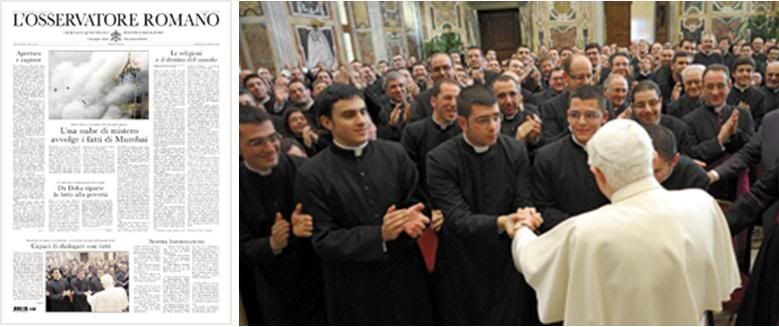
The main news story on Page 1 is a follow-up to the terrorist attack on Mumbai, whose origins are still unclear, even if all 10 terrorists
have been shown to be Pakistani. There is an editorial on 'Openness and reason' on the Pope's recent letter to Marcello Pera;
an editorial commentary on 'Religions adn the fate of the world' by Kalid Fouad Allam, who makes his debut as the Vatican newspaper's
first Muslim guest columnist. The two other Page 1 stories are the new Doha talks on adi to developing nations; and the Pope's
meeting yesterday with seminarians from three regions of Italy (photo).
THE POPE'S DAY
Pastoral visit to St. Lawrence outside the Walls and Holy Mass. Homily.
Angelus for the first Sunday of Advent - After the prayers, the Pope later recalled the Feast
of St. Andrew today for which a Vatican delegation led by Cardinal Walter Kasper is in istanbul to mark
the day with the Patriarchate of Constantinople, as has become traditional in the past few decades.
He also called on the faithful to pray for the victims of the tragedy in Mumbai and the new outbreak
of fighting in Nigeria.
ONE YEAR AGO TODAY ...
Benedict XVI signed and released his second encyclical, Spe salvi.
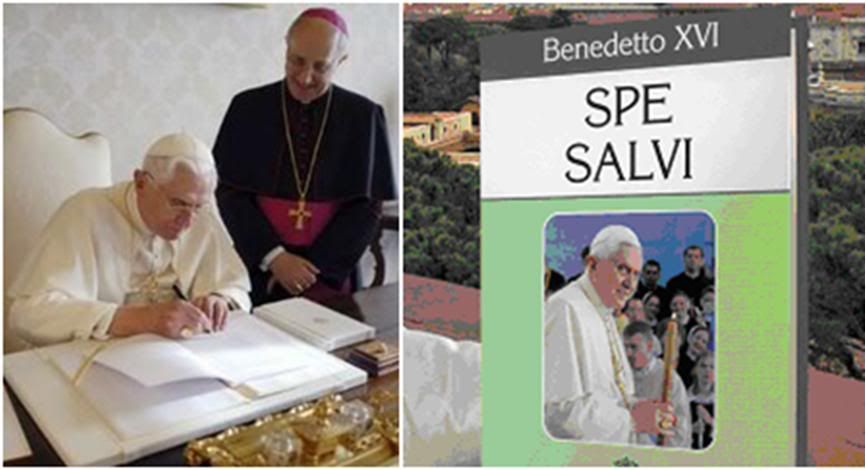
[Modificato da TERESA BENEDETTA 30/11/2008 21:27] |
 30/11/2008 13:21 30/11/2008 13:21 |
|
| | | OFFLINE | | Post: 15.847 | Registrato il: 28/08/2005
| Utente Gold | |
|
 PASTORAL VISIT TO
PASTORAL VISIT TO
SAN LORENZO FUORI LE MURA

At 9 a.m. today, the First Sunday of Advent and the Feast of St. Andrew, the Holy Father arrived for a pastoral visit to the parish of San Lorenzo fuori le Mura in the north sector of Rome, on the occasion of the 21750th year of the martyrdom of sainted deacon and as part of his pastoral visits as Bishop of Rome.
He celebrated Holy Mass starting at 9:45 a.m., following a tribute from the parish priest, Fr. Bruno Mustacchio, O.F.M. Cap.
At the end of the Eucharistic celebration, the Holy Father prayed at the tomb of St, Lawrence, located below the high altar along with that of the first Christian martyr, St. Stephen.
He then met the members of the Lawrentian Jubilee Committee and the community of the Capuchins who are in charge of the parish and the Campo Verano cemetery adjoining the church.
He then descended to the crypt chapel to pray at the tomb of Blessed Pius IX. Leaving the Basilica, he also prayed at the tomb of former Italian Prime Minister Alcide De Gasperi, who is pending beatification.
Caterina's video-caps have, as usual, been posted ahead of the news agency photos, for which we are always very grateful to her.
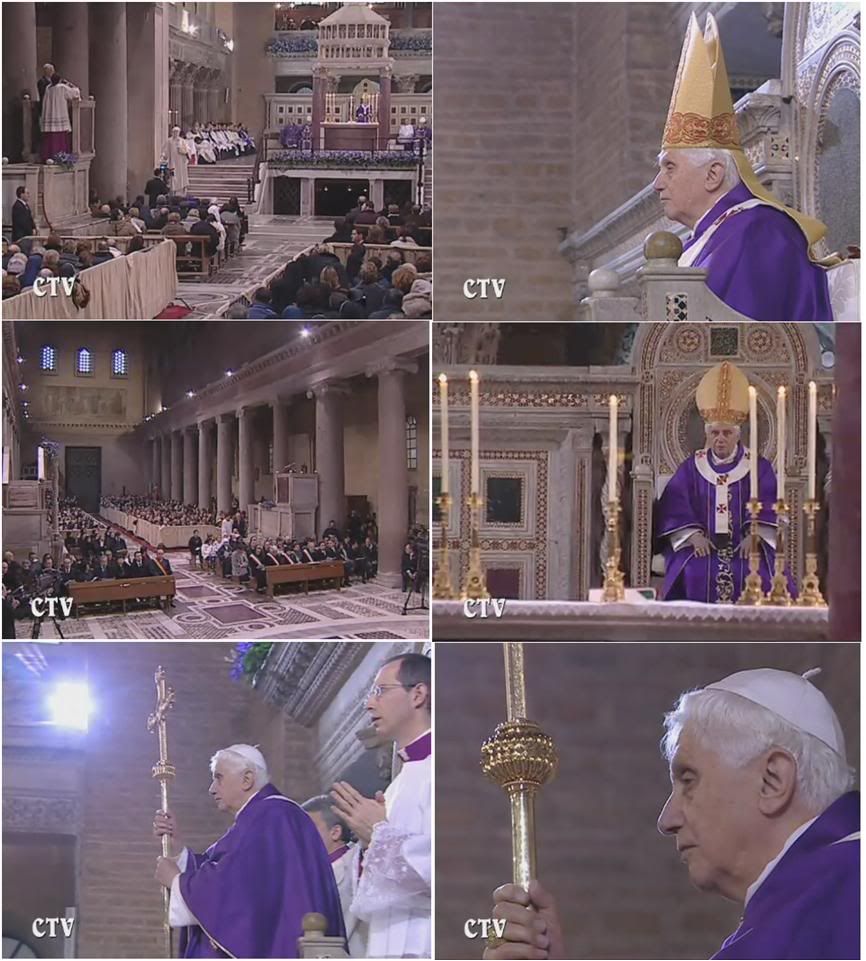
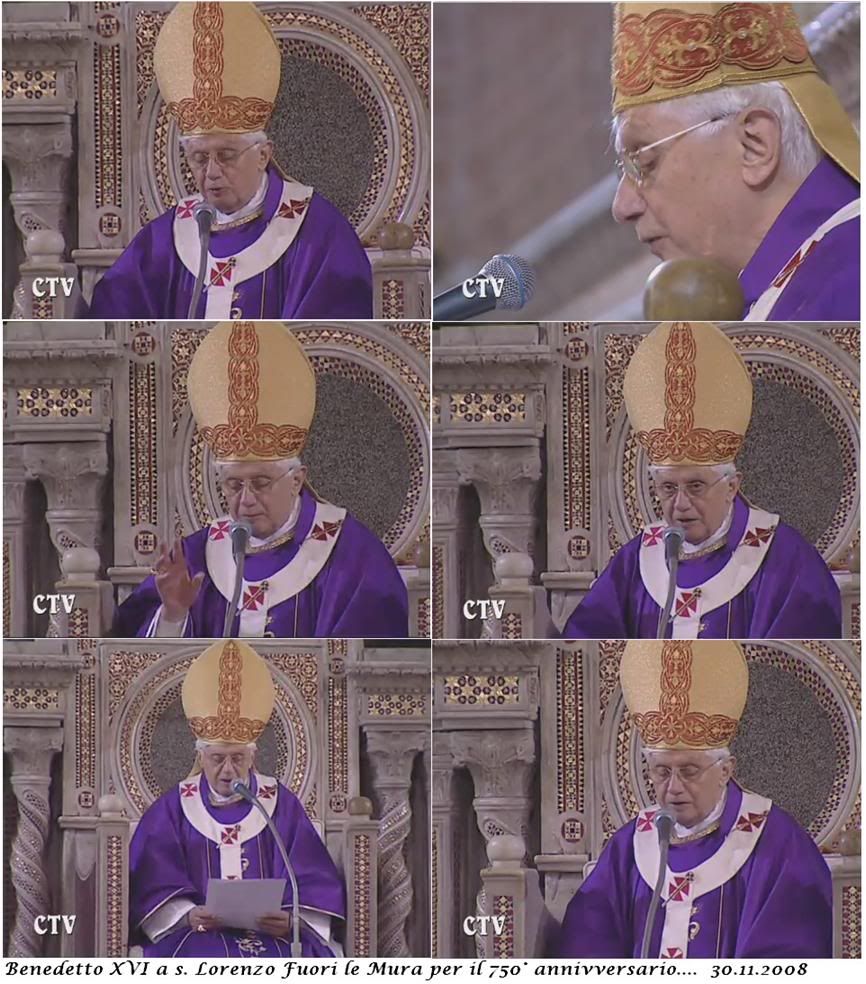
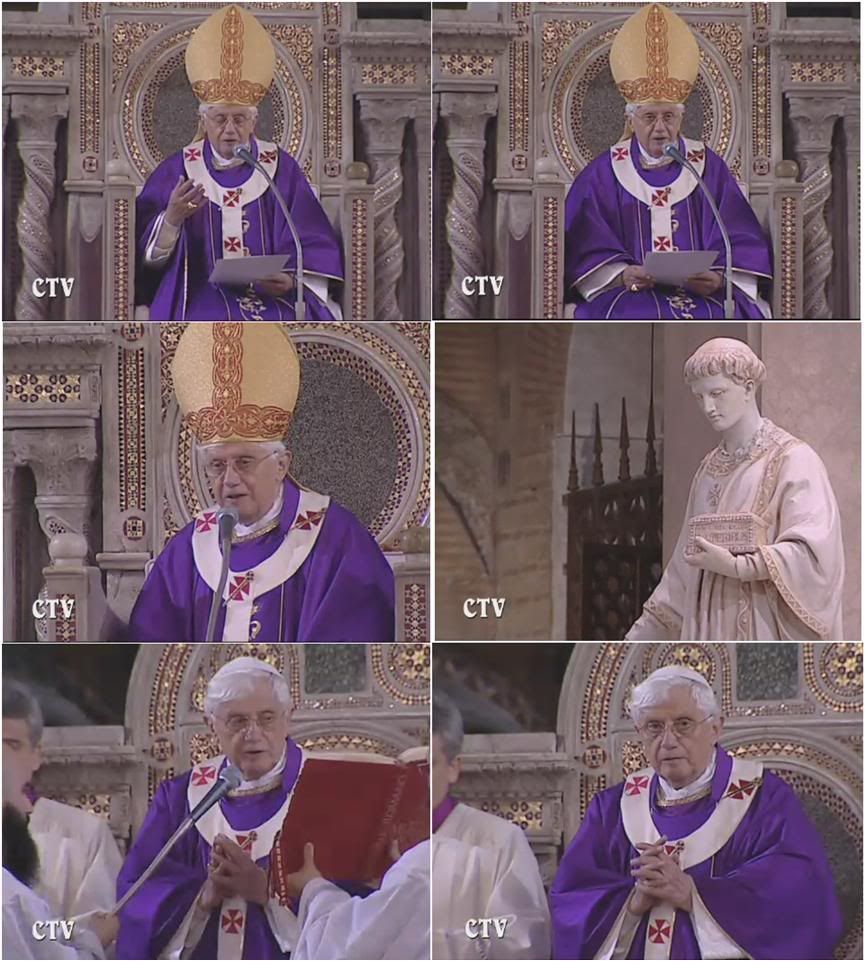
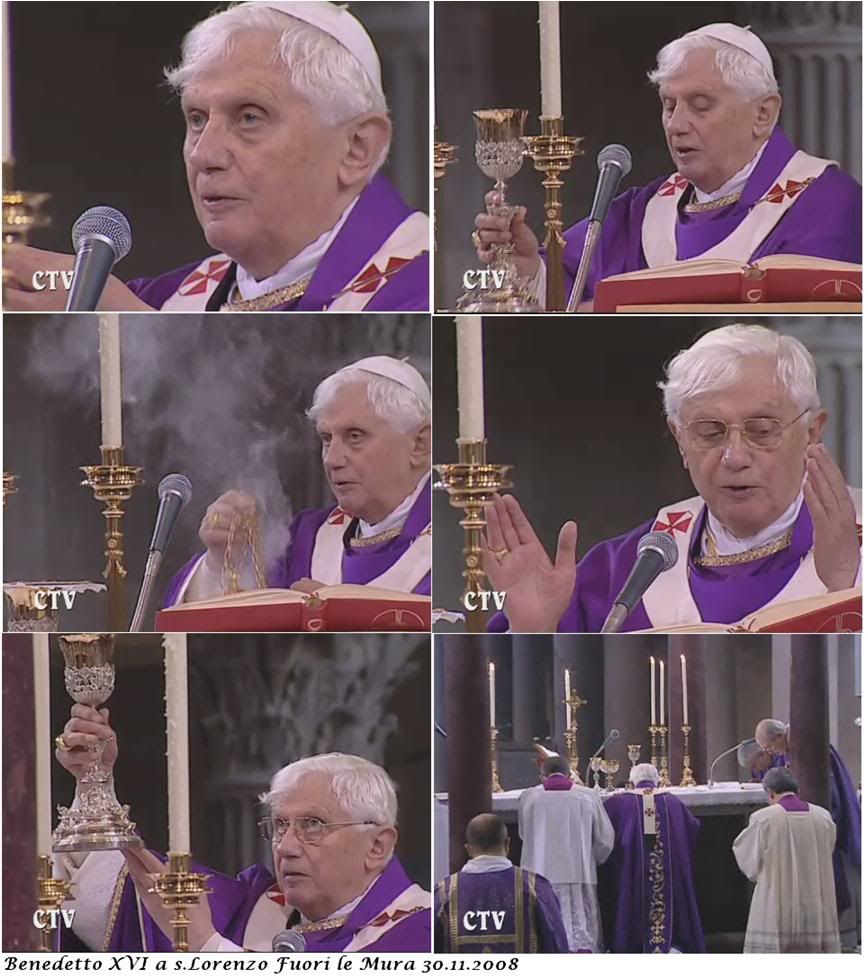
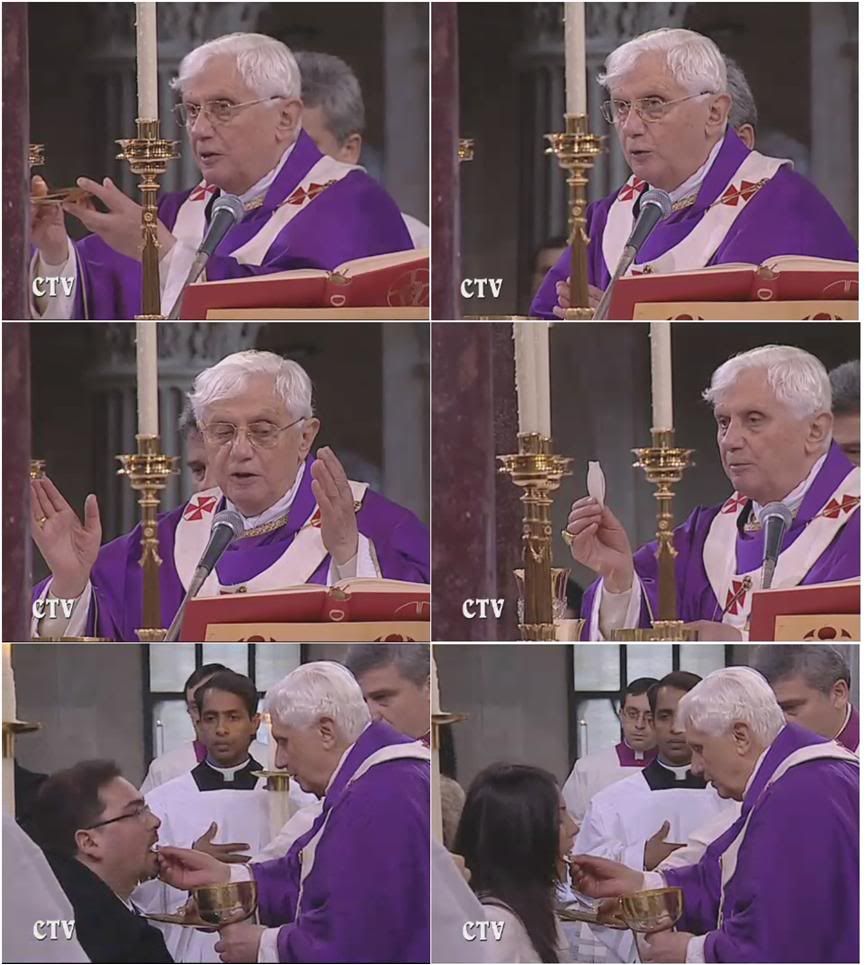
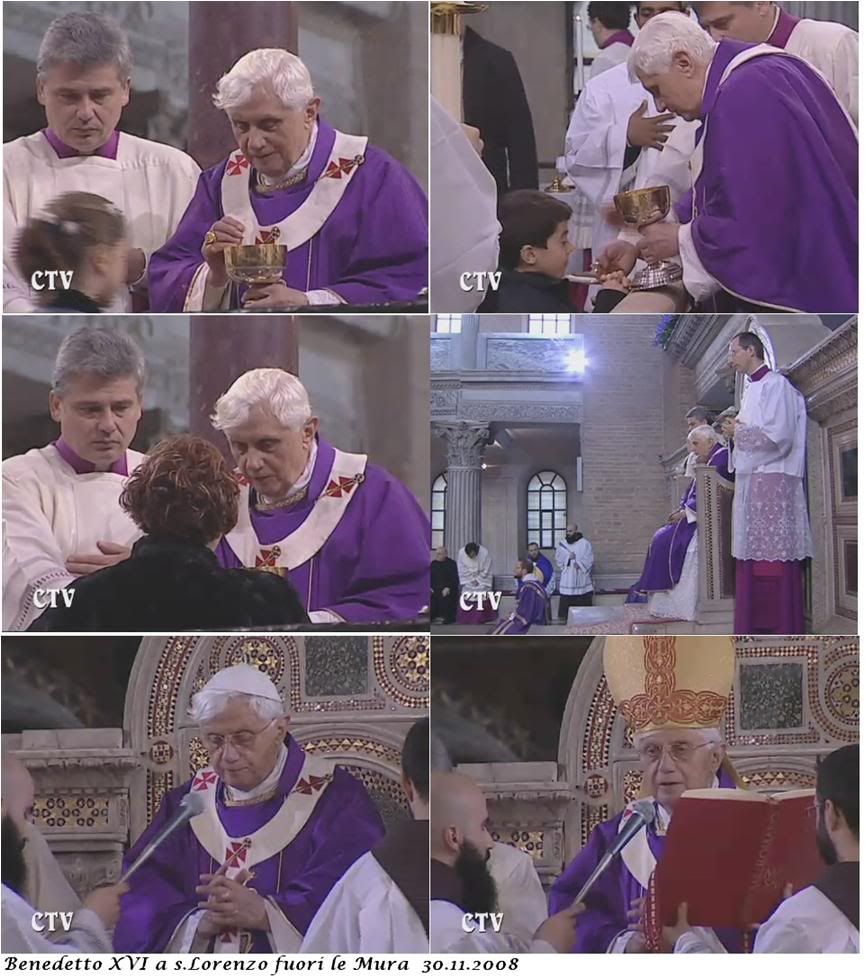
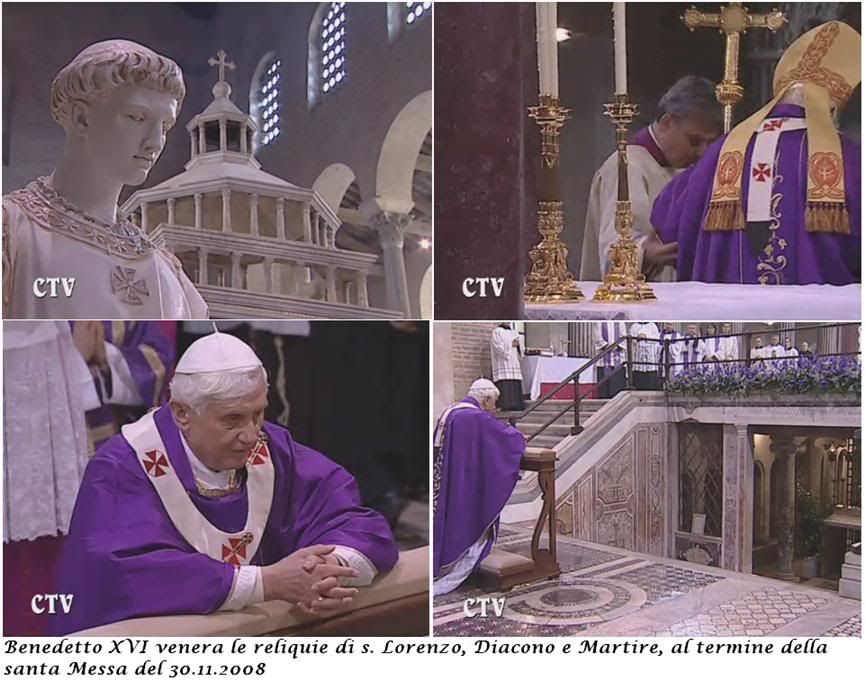
[Modificato da TERESA BENEDETTA 30/11/2008 14:31] |
 30/11/2008 14:31 30/11/2008 14:31 |
|
| | | OFFLINE | | Post: 15.849 | Registrato il: 28/08/2005
| Utente Gold | |
|
 PASTORAL VISIT TO
PASTORAL VISIT TO
SAN LORENZO FUORI LE MURA - II
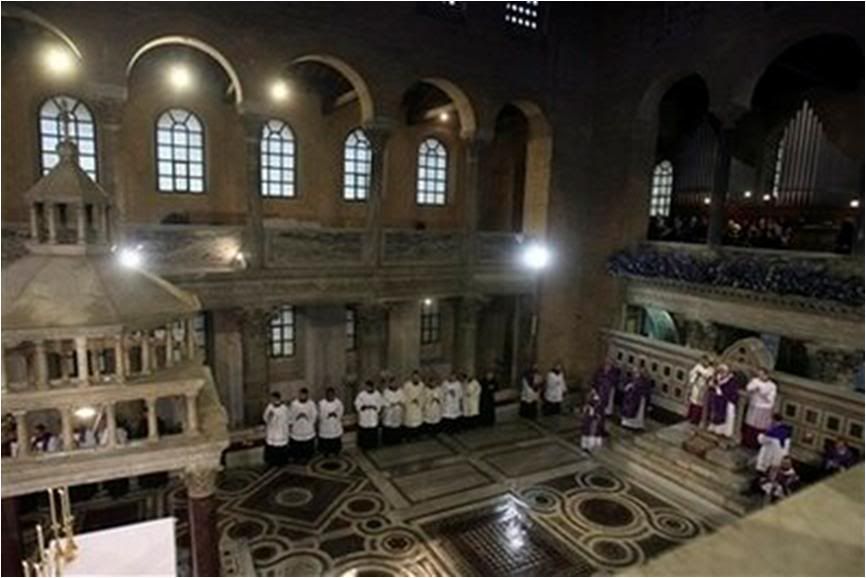
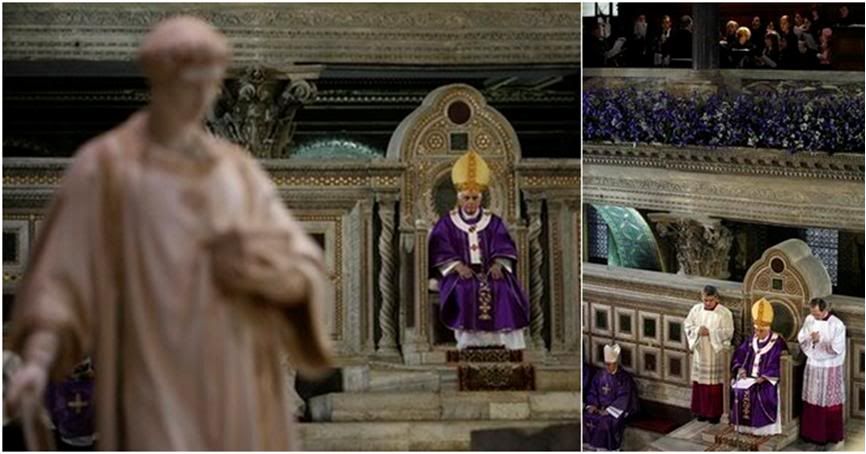
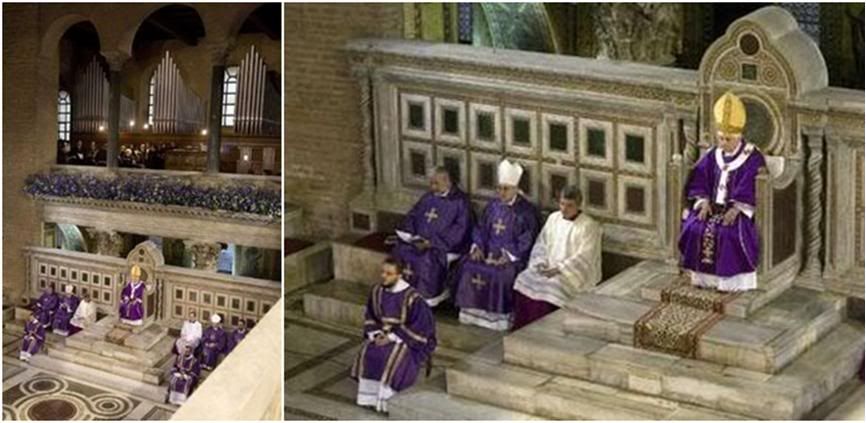
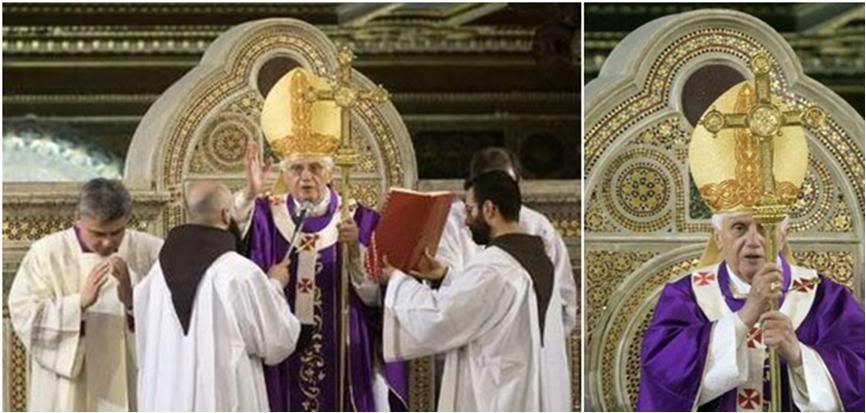
THE HOLY FATHER'S HOMILY
First Sunday of Advent
Dear brothers and sisters:
With the first Sunday of Advent today, we enter that period of four weeks that starts the liturgical year and which directly prepares us for the feast of the Nativity, commemorating the incarnation of Christ in history.
The spiritual message of Advent, however, is more profound, because it projects us towards the glorious return of the Lord at the end of history.
Adventus is a Latin word, which can be translated as arrival, coming, presence. In the language of the ancient world, it was a technical term which referred to the arrival of a functionary, particularly that of a visit by the king or the emperor to the provinces, but it could also be used to mean the appearance of a divinity emerging from his hidden dwelling and thus manifesting his divine power: his presence was solemnly celebrated in [an act of] worship.
In adopting the term Advent, Christians meant to express the special relation that united them with the crucified and resurrected Christ. He is the King, who, having entered this poor province called earth, made a gift to us of his visit; who, after his resurrection and ascension to heaven, nonetheless wanted to stay with us - we perceive his mysterious presence in our liturgical assembly.
In celebrating the Mass, we are proclaiming, in fact, that He has not retreated from the world and he has not left us, and even if we cannot see and touch him as we do can do with material and sensory realities, He is nevertheless with us and among us.
Indeed, he is in us, because he can draw towards him and communicate his own life to every believer who opens his heart to him.
Advent therefore means remembering the first coming of the Lord in the flesh, while thinking now of his definitive return. At the same time, it means acknowledging that Christ present among us makes himself our travelling companion in the life of the Church which celebrates his mystery.
This awareness, dear brothers and sisters, nourished by listening to the Word of God, should help us see the world with different eyes, to interpret the single events of life and history as words addressed to us by God, as signs of his love which assure us of his nearness in every situation.
This awareness, in particular, should prepare us to welcome him when "once again he returns in glory to judge the living and the dead, and his kingdom shall have no end", as we will proclaim soon in the Credo.
In this perspective, Advent becomes for all Christians a time of waiting and hope, a favored time for listening and reflection if we allow ourselves to be guided by the liturgy which invites us to go forward to meet the coming Lord.
"Come Lord Jesus" - that ardent invocation of the first Christian community should become, dear friends, our constant aspiration as well, the aspiration of the Church in every age, which yearns and prepares for the encounter with her Lord.
"Come today, Lord - help us, enlighten us, grant us peace, help us defeat violence. Come Lord, we pray to you especially during these weeks. Let your face shine on us and we shall be saved."
Thus we prayed earlier with the responsorial Psalm. And the prophet Isaiah revealed to us, in the first Reading, that the face of our Lord is that of a kind and merciful Father, who cares for us in every circumstance because we are his handiwork: "You LORD are our father, our redeemer.." (63,16).
Our God is a father ready to forgive all sinners who repent and to welcome those who believe in his mercy (cfr Is 64,4). We were estranged from him because of sin, falling into the dominion of death, but he took pity on us, and of his own initiative, without any merit on our part, he decided to come to us, sending his only Son as our Redeemer.
Before such a great mystery of love, our gratitude rises spontaneously, and our invocation is more confident: "Show us your mercy, Lord, today, in our time, in all parts of the world, and grant us your salvation" (cfr Canto al Vangelo).
Dear brothers and sisters, the thought of the presence of Christ and of his certain return at the end of time, is even more significant in this, your Basilica, next to the monumental cemetery of Verano, where so many of our dear departed repose, awaiting the resurrection.
How many times funeral liturgies have been celebrated here! How many times the words have resounded full of consolation: "In Christ your Son, our savior, may the hope of blessed resurrection shine on us, and as we are saddened by the thought of certain death, we are comforted by the promise of future immortality" (cfr Preface for the Dead I).
But this monumental Basilica of yours, which leads us to think of the primitive church ordered built by the Emperor Constantine which was subsequently transformed to what it is today, speaks to us above all of the glorious martyr St. Lawrence, arch-deacon of Pope Sixtus II, and his trustee in the administration of the assets of the Church.
I came to celebrate the Holy Eucharist today to join you in rendering homage during a singular event, the occasion of the Lawrentian Jubilee Year, declared to commemorate 1750 years since the birth in heaven of the holy Deacon.
History confirms how glorious the name of this saint is, at whose tomb we are gathered. His solicitude for the poor, the generous service he rendered to the Church of Rome in the field of social assistance and charity, his loyalty to the Pope, who inspired him to want to follow him in the supreme trial of martyrdom and the heroic testimony by blood, which he shed just a few days later, are universally known.
 The Pope before the (framed) slab of blood-stained marble on which St. Lawrence is believed to have lain after dhrung his torture.
The Pope before the (framed) slab of blood-stained marble on which St. Lawrence is believed to have lain after dhrung his torture.
St. Leo the Great, in a beautiful homily, commented on the atrocious martyrdom of this 'illustrious hero': "The flames could not conquer the charity of Christ; and the fire which burned him was weaker than that which blazed within him".
He added: "The Lord wished to exalt his glorious name in all the world, that from East to West, in the vivid brilliance of the light radiated by the greatest of deacons, the same glory that came to Jerusalem from Stephen also came to Rome thanks to Lawrence's merit" (Homily 55,4: PL 54,486).
This year is also the 50th anniversary of the death of the Servant of God Pius XII, and this recalls to us an event that was particularly dramatic in the pluricentennial history of your Basilica. It took place during the Second World War, when on July 19, 1943, a violent bombardment inflicted very serious damages on the Church and on the entire neighborhood, sowing death and destruction.
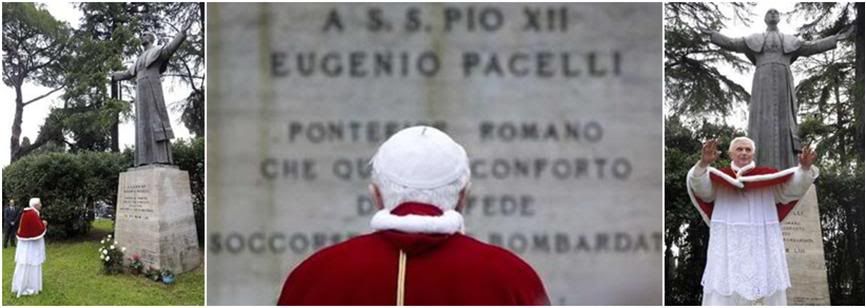 At the memorial to Pius XII's wartime visit after the neighbrohood was bombed in 1943.
At the memorial to Pius XII's wartime visit after the neighbrohood was bombed in 1943.
Never can that generous gesture by my venerated predecessor be erased from historical memory, in coming immediately to the aid and comfort of the people who had been so severely struck, meeting them among still-smoking ruins.
Neither can I forget that this Basilica also houses the remains of two other great personages.
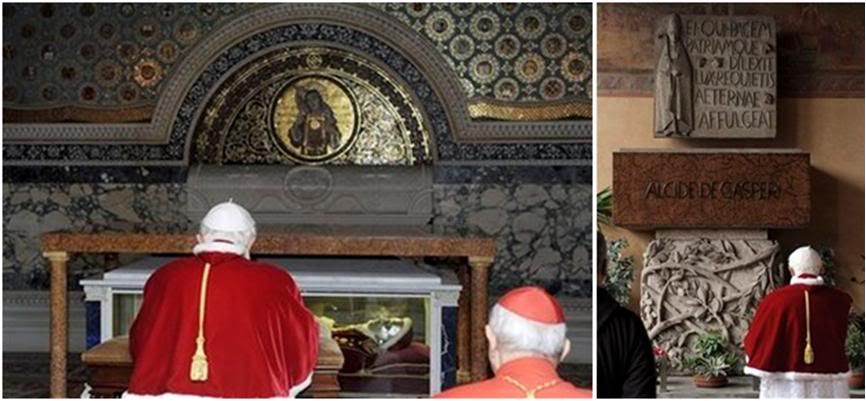 The Pope at the sarcophagus of Pius IX, and before the tomb of Alcide De Gasperi.
The Pope at the sarcophagus of Pius IX, and before the tomb of Alcide De Gasperi.
In the hypogeum [underground crypt], the mortal remains of Blessed Pius IX have been placed for the veneration of the faithful; and in the atrium is the tomb of Alcide De Gasperi, a wise and fair-minded leader for Italy in the difficult years of postwar reconstruction, who was, at the same time, an illustrious statesman who was capable of looking at Europe with wide-ranging Christian vision.
While we are gathered together in prayer, I am pleased to greet you all with affection, starting with the Cardinal Vicar; the Vice Regent, who is also the Abbot of the Basilica; the Auxiliary Bishop of the North Sector; and your parish priest, Fr. Bruno Mustacchio, whom I thank for the kind words he addressed to me before the start of the Mass.
I greet the Minister General of the Capuchin Order and the brothers of the Community who have been carrying out their service with seal and dedication - welcoming the numerous pilgrims, assisting the pooer in charity, and testifying to hope in the resurrected Christ to all who visit the cemetery of Verano. I wish to assure you of my appreciation, and above all, of remembrance in my prayers.
I also greet the various groups involved in catechesis, liturgy and charity; the members of the two polyphonic choirs, and the local and regional branches of the Third Franciscan Order.
I particularly appreciate the fact that for many years now, this parish has been home to the 'diocesan missionary laboratory' to educate the parish communities in missionary awareness, and I gladly join you in hoping that this initiative in our Diocese may contribute to inspire a courageous pastoral missionary activity, which will bring the message of God's merciful love to every corner of Rome, involving above all the young people and families.
Finally, I wish to extend my greeting to all the inhabitants of this quarter, especially the aged, the sick, the people who are alone and in difficulty. I pray for each and everyone in this Holy Mass.
Dear brothers and sisters, at the start of Advent, what better message to draw from St. Lawrence than that of sanctity? He repeats to us that sanctity - that is, walking forward to Christ who is always coming to visit us, is never out of fashion, but, with the passing of time, it shines more luminously and shows the perennial tendency of man to reach out to God.
Therefore, may this jubilee commemoration be an occasion for your parish community for a renewed adherence to Christ, for a greater examination in depth of your sense of belonging to his Mystical Body which is the Church, and for a constant commitment to evangelization through charity.
May St. Lawrence, heroic witness to the crucified and resurrected Christ, be for each one an example of obedient adherence to the divine will, in order that, as we heard the apostle Paul remind the Corinthians, we too can live in a way that we may be found 'irreproachable' on the day of the coming of the Lord (cfr 1 Cor 1,7-9).
To prepare ourselves for the advent of Christ is also the exhortation we gather from today's Gospel: "Be watchful", Jesus tells us in the brief parable of the master who leaves home but does not know when he will return (cfr Mk 13,33-37).
To be watchful means to follow the Lord, to choose what he chose, love as he loved, conform our own life to his. To be watchful means to pass every moment of our time within the horizon of his love without allowing ourselves to be beaten by the inevitable difficulties and problems of daily life.
That is what St. Lawrence did. This we should do, and let us ask the Lord to give us the grace so that Advent may be a stimulus for everyone to walk in this direction.
May we be guided and accompanied by the intercession of the humble Virgin of Nazareth, Mary, chosen by God to become the Mother of the Redeemer; by St. Andrew, whose feast we celebrate today; and by St. Lawrence, example of intrepid Christian faithfulness unto martyrdom. Amen.
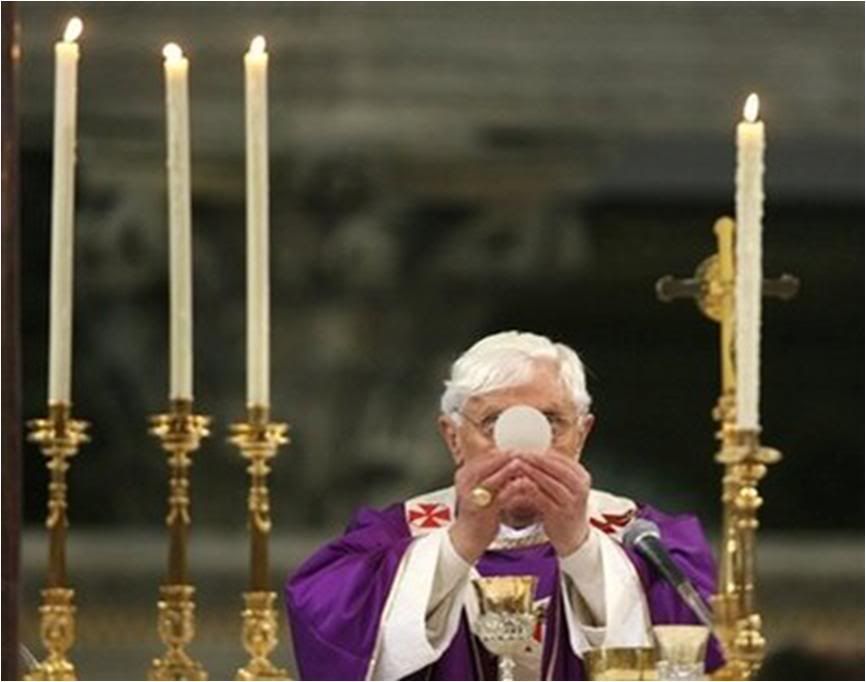
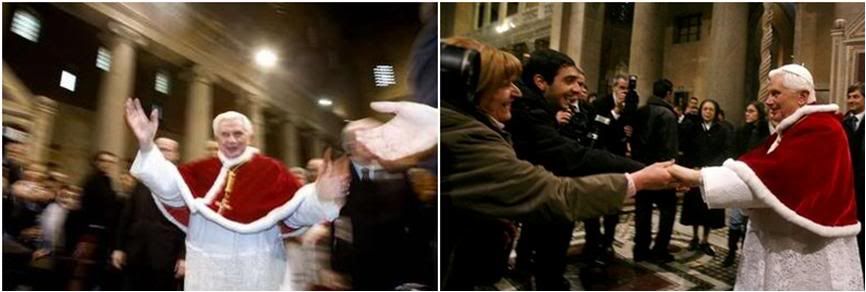
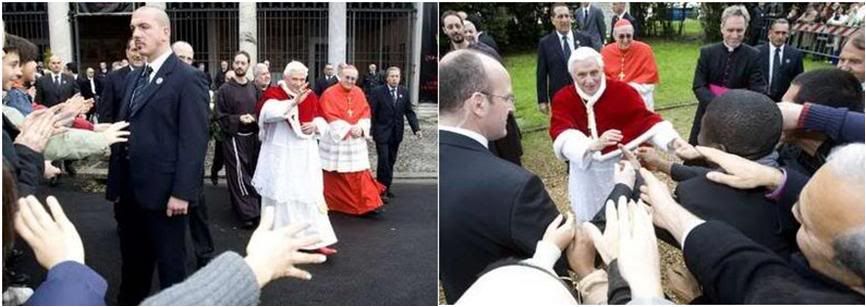
[Modificato da TERESA BENEDETTA 30/11/2008 17:23] |
 30/11/2008 16:51 30/11/2008 16:51 |
|
| | | OFFLINE | | Post: 15.853 | Registrato il: 28/08/2005
| Utente Gold | |
|
 ANGELUS TODAY
ANGELUS TODAY
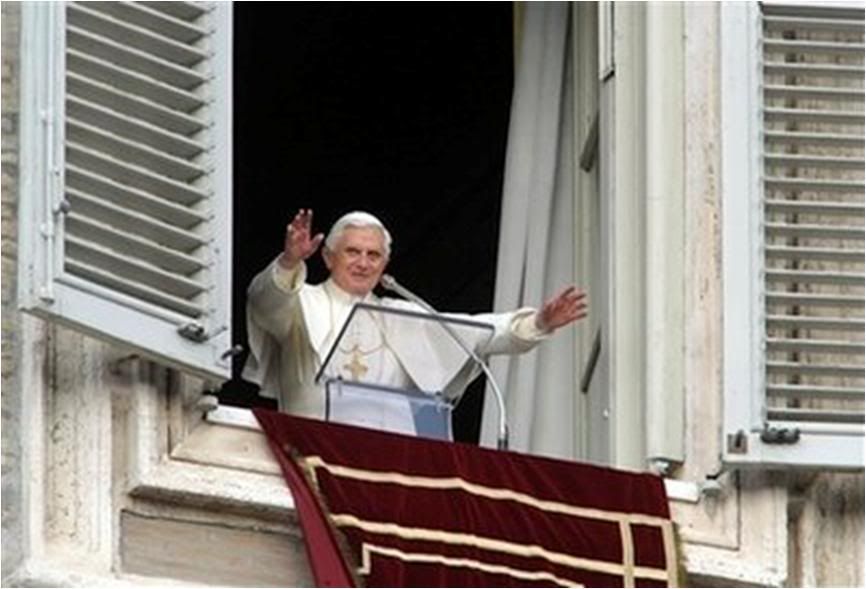 Here is a translation of the Holy Father's words at the Angelus today:
Here is a translation of the Holy Father's words at the Angelus today:
THE HOLY FATHER'S ANGELUS MESSAGES
Dear brothers and sisters:
Today, with the first Sunday of Advent, we begin a new liturgical year. This invites us to reflect on the dimension of time, which always exercises a great fascination on us.
As Jesus liked to do, I wish nonetheless to start from a very concrete observation: we all say "We do not have time" because the rhythm of daily life has become so frenetic for everyone. But even in this respect, the Church brings 'good news': God gives us his time.
We always have too little time. Especially for the Lord, we do not know how to find the time - or sometimes, we don't want to.
Well, God has time for us! This is the first thing that the start of a liturgical year makes us rediscover with fresh wonder. Yes, God gives us his time, because he entered history with his Word and his work of salvation, to open it up to the eternal, to make it become a story of alliance with him.
In this perspective, time is already in itself a fundamental sign of God's love - a gift which man, as he can with any other thing, can either value or waste; he can comprehend its significance, or ignore it out of obtuse superficiality.
There are three great 'hinges' of time that mark the story of salvation: in the beginning is creation; in the center, incarnation-redemption; and in the end, parousia, the Final Coming of the Lord which also includes the Universal Judgment.
But these three instances are not to be understood simply as a chronological succession.
Indeed, creation is at the beginning of everything, but it is also continuous and takes place along the entire course of cosmic becoming, to the very end of time.
Likewise, incarnation-redemption took place at a specific historical moment - Jesus's passage through earth - but its range of action extends to the preceding time and to that which follows.
In their turn, the Final Coming and the last Judgment - which were anticipated decisively on the Cross of Christ - exercise their influence on the conduct of men in every age.
The liturgical season of Advent celebrates the coming of God, in both its instances: First, it invites us to reawaken our expectation of the glorious return of Christ. Thus, as Christmas approaches, it calls us to welcome the Word-made-flesh for our salvation.
But the Lord continually comes into our life. How very timely then is Jesus's appeal which is powerfully re-proposed to us on this first Sunday of Advent: "Be watchful!" (Mk 13,33.35.37) It was addressed to his disciples, but also 'to everyone", because each of us, at a time known only to God, will be called to account for our own existence.
This implies proper detachment from earthly goods, sincere repentance for our errors, active charity towards our neighbor, and above all, a humble and confident entrusting of oneself into the hands of God, our kind and merciful Father.
The icon of Advent is the Virgin Mary, Mother of Jesus. Let us invoke her so that she may help us to become an extension of mankind for the Lord who is coming.
After the Angelus prayers, he said this:
November 20 is the Feast Day of the Apostle St. Andrew, brother of Simon Peter. Both were followers of John the Baptist, but after the baptism of Jesus in the Jordan, they became his disciples, having recognized in him the Messiah.
St. Andrew is the patron of the Patriarchate of Constantinople, and therefore the Church of Rome feels itself bound to that of Constantinople by a bond of special brotherhood.
Following what has now become a tradition on this happy occasion, a delegation of the Holy See, led by Cardinal Walter Kasper, president of the Pontifical Council for Promoting Christian Unity, is visiting Ecumenical Patriarch Bartholomew I.
With all my heart, I address my greeting and my best wishes to him and the faithful of the Patriarchate, invoking on all the abundance of heavenly blessings.
I wish to invite you now to join in prayers for the numerous victims of the brutal terrorist attacks in Mumbai, India, and of the deadly encounters that have just erupted in Jos, Nigeria, for all those who were injured and who were in any way affected by these events.
The causes and the circumstances of these tragic events are diverse, but the horror and deploration for the explosion of such cruel and senseless violence must be common.
Let us ask the Lord to touch the hearts of those who delude themselves that violence is the way to resolve local or international problems, and let us feel impelled to give an example of kindness and love in order to build a society that is worthy of God and of man.
In English, he said:
I am happy to greet all the English-speaking pilgrims and visitors present for this Angelus prayer. I offer a special welcome to the participants in the Youth Meeting at the European University of Rome.
Today, the First Sunday of Advent, the Church begins a new liturgical year. The Gospel invites to be prepared as faithful servants for the coming of Christ.
May Advent be a time of preparation that leads us to a life centred on our Christian hope. May God bless you all!
To Polish-speaking pilgrims, he said:
I welcome the Poles, with a particular greeting to the participants in the Roman Encounter of Youth, who have gathered here from different countries in order to seek together from the teachings of John Paul II inspiration and perspectives for a fruitful life.
In this effort to construct a future of ha[[happiness, may you be sustained by the protection of Mary. May God bless all present.
Pope condemns violence
in India and Nigeria

VATICAN CITY, Nov. 30 (AP) - Pope Benedict XVI has condemned terrorist attacks in India and sectarian fighting in Nigeria as "cruel and senseless."
Addressing a crowd in St. Peter’s Square after his traditional Sunday blessing, Benedict denounced the "brutal terrorist attacks" in Mumbai as well as the ethnic and religious clashes that have rocked the central Nigerian city of Jos.
"The causes and circumstances of those tragic events are different, but both should be met with horror and disapproval for the explosion of so much cruel and senseless violence," Benedict said.
The Pope asked the faithful to pray that God would "touch the heart of those who delude themselves by thinking that this is the way to solve local and international problems."
He also called for prayers for the dead, the wounded and all those caught up in the violence.
At least 174 people have been killed in the shooting attacks on 10 sites in Mumbai, while more than 300 people are dead after a dispute over local elections turned into sectarian violence between Christians and Muslims in Jos, Nigeria.
[Modificato da TERESA BENEDETTA 30/11/2008 21:19] |
 30/11/2008 18:21 30/11/2008 18:21 |
|
| | | OFFLINE | Post: 1.658 | Registrato il: 27/11/2005
| Utente Veteran | |
|
|
 01/12/2008 01:31 01/12/2008 01:31 |
|
| | | OFFLINE | Post: 3.447 | Registrato il: 23/11/2005
| Utente Master | |
|
Obama vs. Pope Benedict
Jeffery T. Kuhner
COMMENTARY, Washington Times
Sunday, November 30, 2008
President-elect Barack Obama's plan to pass the Freedom of Choice Act is setting up a showdown with the Vatican.
"The first thing I will do as president is sign the Freedom of Choice Act," he said at an address before Planned Parenthood on July 17, 2007. And if he does, it will trigger a harsh response from Pope Benedict XVI, as well as a political revolt among practicing American Catholics.
Mr. Obama signing the Freedom of Choice Act (FOCA) "would be the equivalent of a war," a senior Vatican official told Time magazine last week. "It would be like saying, 'We've heard the Catholic Church and we have no interest in their concerns.' " At a recent Baltimore meeting, the U.S. Catholic bishops pledged to challenge Mr. Obama on his defense of abortion rights.
FOCA seeks to codify Roe v. Wade into federal law. It would remove all restrictions on abortion in state statutes - including restraints on late-term abortions and parental notification laws. It would also entrench taxpayer funding of abortion. Moreover, it would compel Catholic health-care facilities to provide the heinous procedure. In short, it constitutes a fundamental assault on basic Catholic doctrine.
Mr. Obama is a radical on abortion. He is vehemently pro-choice, even opposing the ban on partial-birth abortion. While in the Illinois state legislature, Mr. Obama voted against legislation protecting babies born in botched abortions.
Many liberal Catholics insist abortion is a single issue, a strange obsession of traditionalist diehards. Besides, they argue there is so much more to Catholic social thought. There is poverty, social justice, the environment and Iraq. Abortion is only one among many concerns shared by Catholics. They believe the church would be better served by focusing on creating a society based on communitarian values, the redistribution of power and wealth along more equitable lines, and an antiwar foreign policy.
Yet, abortion is the seminal moral issue of our time. Nearly 50 million unborn babies have been murdered since Roe v. Wade legalized abortion in 1973. If one includes Europe, the number of dead fetuses is staggering. Abortion has claimed more victims than either of the two great totalitarian ideologies of the 20th century, communism and Nazism.
Both Pope Benedict and the late Pope John Paul II have not only decried abortion as state-sanctioned infanticide, but explicitly - and repeatedly - said it must be outlawed: There can be no compromise with such monstrous barbarism. Abortion is akin to the Jewish question in Europe during the 1930s: Should an entire class of people be denied their essential humanity?
Catholic supporters of Mr. Obama insist it is sufficient to reduce the number of abortions. They say it's time to put the polarizing debate over Roe v. Wade in the past, accept legalized abortion as a reality, and work toward compromise solutions such as promoting adoption.
This is like saying Western democracies should have come to terms with the Aryan racial laws of Nazi Germany, and sought to minimize the number of Jews sent to the gas ovens. The argument is morally repugnant and politically naïve. Ultimately, accommodation with evil never works. We learned that with Nazi Germany and with slavery in this country.
Pro-Obama Catholics fail to recognize abortion is the centerpiece of the 1960s sexual revolution. The secular left spearheaded this frontal assault on Christianity and traditional bourgeois civilization.
The result has been the proliferation of pornography, rampant permissiveness, the loss of innocence among many of our teens, the coarsening of our culture, sky-rocketing divorce rates, countless children raised in broken homes, and the deaths of millions due to sexually transmitted diseases.
Rather than a hedonistic utopia, liberal progressives have engendered a social nightmare. They must defend abortion at all costs because their goal is to make sex consequence free, forging a revolutionary order characterized by moral relativism and unlimited sexual gratification. But sex is never consequence free: it is laden with moral choices.
The Vatican is the last line of defense against the new Dark Age. It is time for the Holy Father to personally speak out against FOCA and warn pro-choice Catholics in the Obama administration they will not only be refused communion at Mass but face excommunication. No self-respecting, principled Catholic can or should support murder - regardless of who occupies the White House.
|
 01/12/2008 13:53 01/12/2008 13:53 |
|
| | | OFFLINE | | Post: 15.856 | Registrato il: 28/08/2005
| Utente Gold | |
|

No OR today.
THE POPE'S DAY
The Holy Father met today with
- H.W. Mahinda Rajapaksa, President of the Democratic Socialist Republic of Sri Lanka, and his delegation.
- Cardinal Francis Eugene George, O.M.I., Archbishop of Chicago, and president of the US Conference
of CAtholic Bishops.
- H.E. Mons. Cristián Enrique Contreras Molina, O. de M., Bishop of San Felipe (Chile), on ad-limina visit.
- Professors and students of the University of Parma. Address in Italian.
The Vatican released the text of the Holy Father's letter to Ecumenical Patriarch Bartholomew I
on the Feast of St. Andrew, patron of the Church of Constantinople.
THE HOLY FATHER'S
PRAYER INTENTIONS FOR DECEMBER 2008
General Intention:
"That, faced by the growing expansion of the culture of violence and death, the Church may courageously promote the culture of life through all her apostolic and missionary activities."
Apostolic intention:
"That, especially in mission countries, Christians may show through gestures of brotherliness that the Child born in the grotto in Bethlehem is the luminous Hope of the world."
POPE MEETS PRESIDENT
OF SRI LANKA

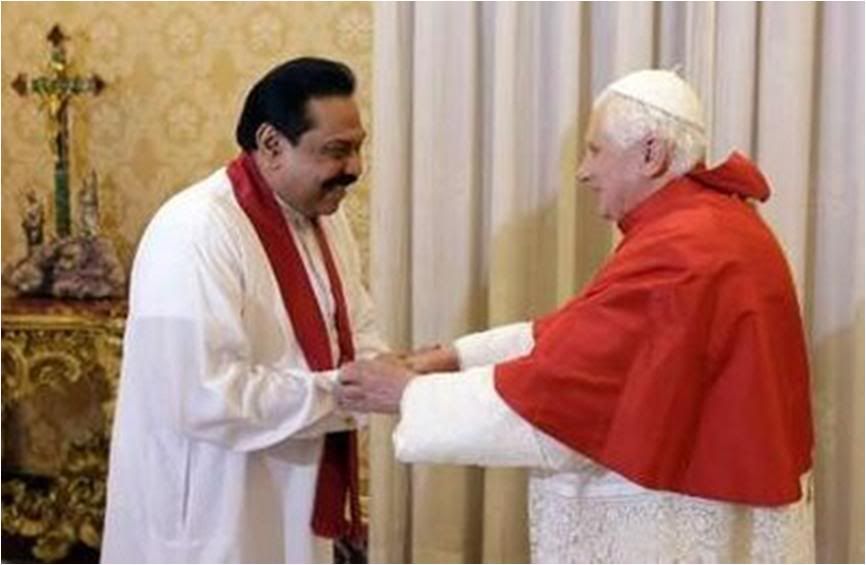
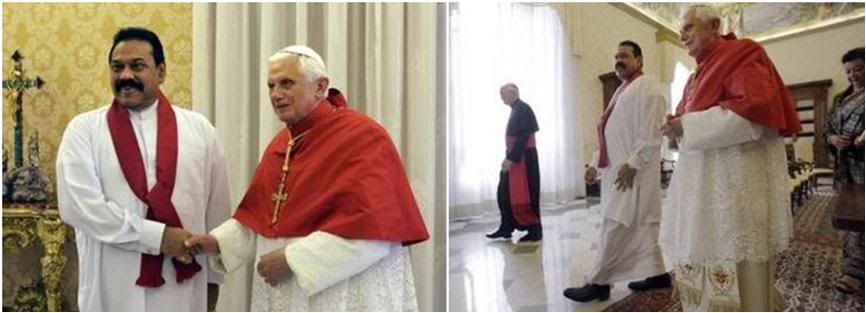
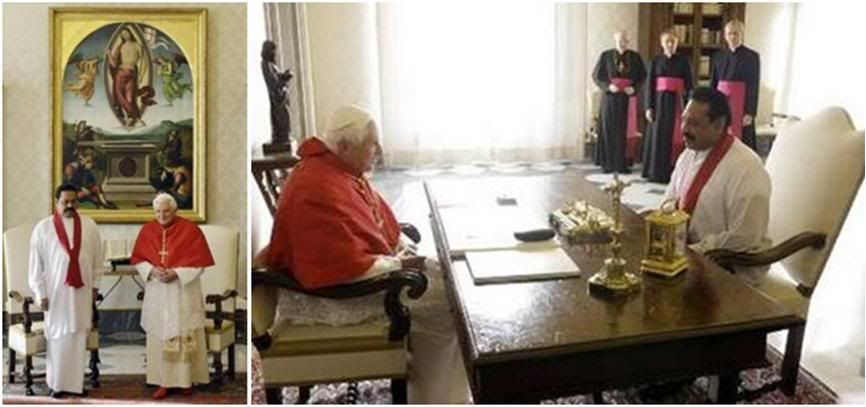
Here is the statement issued by the Vatican Press Office on the Holy Fahter's audiene yesterdya with the President of Sri Lanka:
Today, 1st December 2008, the Holy Father Benedict XVI received in Audience the President of the Democratic Socialist Republic of Sri Lanka, His Excellency Mahinda Rajapaksa, who subsequently met His Eminence Cardinal Tarcisio Bertone, Secretary of State, accompanied by His Excellency Archbishop Dominique Mamberti, Secretary for Relations with States.
The cordial discussions took into consideration the present situation in Sri Lanka in order to underline the necessity of meeting the basic needs of the deeply affected civilian population and consolidating the path of dialogue and negotiation, which is the only way to reach a just and lasting political solution to the ongoing conflict.
The hope was also expressed that the Catholic Church would continue to enjoy the full right to religious freedom, thus enabling her to make a significant contribution to the life of the country through her religious witness, her educational, health-care and charitable initiatives, and her commitment to work for the common good, reconciliation and peace.
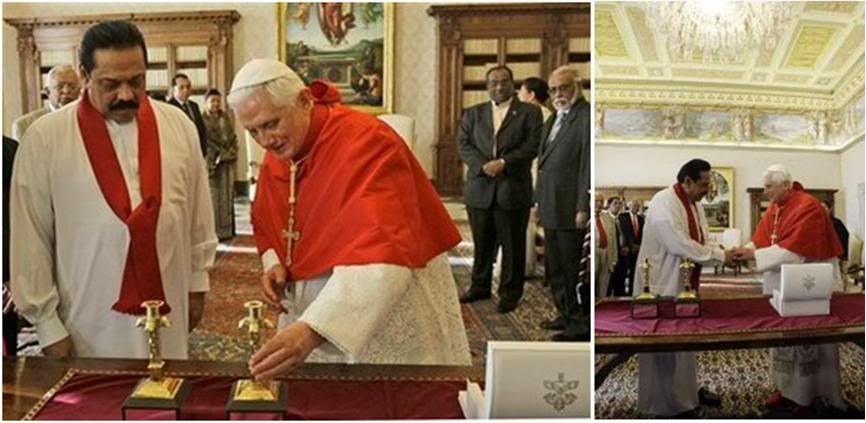
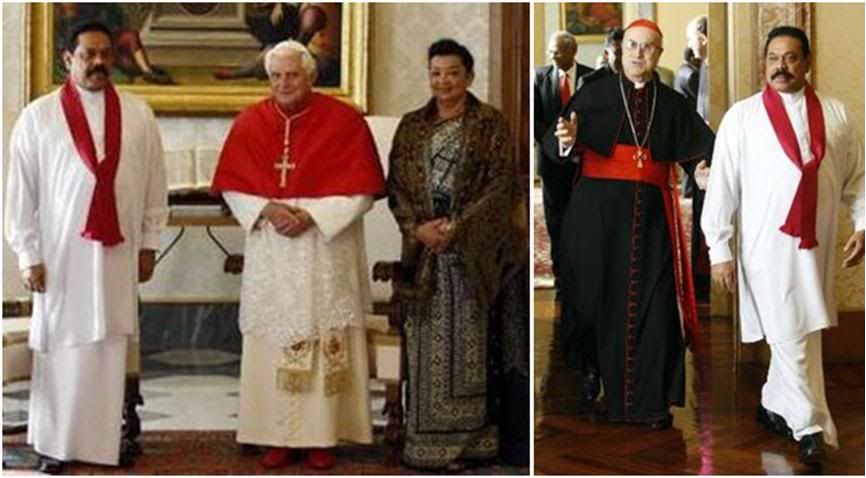 Pope speaks to Parma students
Pope speaks to Parma students
of the university and reform

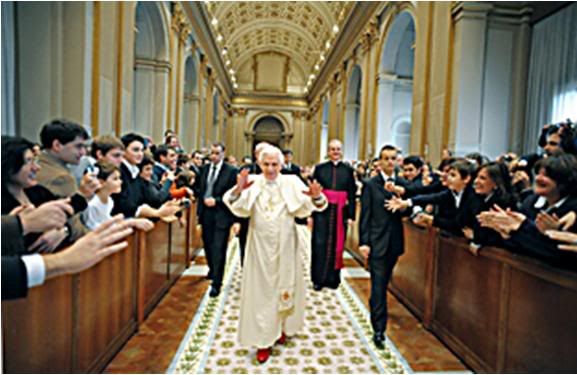
Pope Benedict XVI reflected on the nature of University and the meaning of reform Monday when he met with a group of University students and professors from Parma in Northern Italy.
Pope Benedict began his discourse on a personal note, recalling the many years of his own life dedicated to research and teaching. He told the students that he continues to feel a close spiritual bond to University life and to follow its progress closely.
He then went on to speak of an Italian Saint, Hermit and Doctor of the Church, Peter Damian, from whose life he said today's university students and even professors can learn valuable lessons.
Although living in the seclusion of the cloister, St Peter Damian was a forceful figure in the Gregorian Reform movement, whose personal example and many writings exercised great influence on religious life in the 11th and 12th centuries.
Our era, just as that of St Peter Damian, reflected Pope Benedict, is signed by uncertainties and a lack of unifying principals. Academic study he remarked, should serve to qualify the formative level of society, not just scientific research. It must offer young people the opportunity to mature intellectually, morally and civilly, by confronting themselves with those great questions that cry out the conscience of modern man.
The Pope noted that the story of St Peter Damien, the great reformer of the Church, teaches us that every authentic reform must be first a spiritual and moral one that begins within the conscience.
He observed that the subject of University reform is a current topic in Italy, reflecting that structural and technical changes can only be effective if they are accompanied by a series examination of conscience by University authorities, administrators, professors and students.
Pope Benedict underlined that if we want a human environment to improve in quality and effectiveness, then we must begin by each one of us reforming ourselves, correcting that which could damage or obstruct the common good.
He reflected that just as St Peter Damien laboured for the reform of the Church so that the Church would enjoy greater spiritual and historical freedom, that University reform can only be valid if its ultimate goal is freedom; freedom of teaching, freedom of research, freedom of the academic institution from political and economic powers.
This, he said, does not mean that the University become self-referential, or exploit public resources, it means freedom in the Christian sense, freedom of the University to culturally and scientifically form people for the development of a civil society.
In conclusion, the Holy Father said today's younger generations are exposed to a double risk, largely due to the widespread use of new technologies: on one hand, he noted, there is a danger that the students capacity for concentration and mental application on a personal level are reduced; on the other hand there is a danger that the students isolate themselves in an increasingly virtual reality.
The university, by its very nature, observed the Pope, embodies that virtuous equilibrium between the individual and the community, between research and reflection, always open to the universal horizon
[Modificato da TERESA BENEDETTA 03/12/2008 13:53] |
 02/12/2008 12:41 02/12/2008 12:41 |
|
| | | OFFLINE | | Post: 15.858 | Registrato il: 28/08/2005
| Utente Gold | |
|
 BENEDICT XVI'S MESSAGE
BENEDICT XVI'S MESSAGE
TO BARTHOLOMEW I
ON ST. ANDREW'S DAY

In the framework of a now traditional exchange of delegations for the respective feasts of their Patron Saints - June 29 in Rome for the Feast of Saints Peter and Paul, and November 30 in Istanbul for the Feast of St. Andrew, Cardinal Walter Kasper led a delegation of the Holy See to the 2008 Feast of the Ecumenical Patriarchate.
The President of the Pontifical Council for Promoting Christian Unity was accompanied by Mons. Brian Farrell, Secretary of the Council, and Fr. Vladimiro Caroli, O.P., of the Council's Oriental Section, who were joined in Istanbul by the Apostolic Nuncio in Turkey, Mons. Antonio Lucibello.
The Vatican delegation took part in the Divine Liturgy presided by His Holiness Bartholomew I in the Patriarchal Church at the Phanar, and had a meeting with the patriarch as well as conversations with the Synodal Commission in charge of relations with the Catholic Church.
Also taking part in the Commission meeting were the Co-President and Co-Secretary of the Mixed International Commission for Theological Dialog between the Catholic Church and all the Orthodox Churches.
Cardinal Kasper brought the Ecumenical Patriarch a gift from the Holy Father, along with a letter (in English), whose text is reproduced here.
To His Holiness Bartholomew I
Archbishop of Constantinople
Ecumenical Patriarch
"Grace to you and peace from God the Father" (Gal 1:3)
It is with deep joy that I address these words of Saint Paul to Your Holiness, the Holy Synod and all the Orthodox clergy and lay people assembled for the feast of Saint Andrew, the brother of Saint Peter and, like him, a great apostle and martyr for Christ.
I am pleased to be represented on this festal occasion by a delegation led by my venerable brother Cardinal Walter Kasper, President of the Pontifical Council for Promoting Christian Unity, to whom I am entrusting this message of greetings.
My own prayers join with yours as we plead with the Lord for the well-being and unity of the followers of Christ throughout the world.
I give thanks to God that he has enabled us to deepen the bonds of mutual love between us, supported by prayer and ever more regular fraternal contact.
In the course of the year that is now drawing to a close, we have been blessed three times by the presence of Your Holiness in Rome: on the occasion of your magisterial address at the Pontifical Oriental Institute, which is honoured to number you among its alumni; at the opening of the Pauline Year on the feast of Rome's patron saints, Peter and Paul; and at the Twelfth Ordinary General Assembly of the Synod of Bishops of the Catholic Church, held in October on the Word of God in the Life and Mission of the Church, when you delivered a most thoughtful address.
As a sign of our growing communion and spiritual closeness, the Catholic Church for her part was represented at the celebrations of the Pauline Year overseen by Your Holiness, including a symposium and a pilgrimage to the Pauline sites in Asia Minor. These experiences of encounter and shared prayer contribute to an increase in our commitment to attain the goal of our ecumenical journey.
In this same spirit, Your Holiness has informed me of the positive outcome of the Synaxis of the Primates and Representatives of the Orthodox Churches, which took place recently at the Phanar.
The hopeful signs which emerged for inter–Orthodox relations and ecumenical engagement have been welcomed with joy. I believe and pray that these developments will have a constructive impact on the official theological dialogue between the Orthodox Churches and the Catholic Church, and will lead to a resolution of the difficulties experienced in the last two sessions.
As Your Holiness remarked during your address to the Synod of Bishops of the Catholic Church, the Joint International Commission for Theological Dialogue between Catholics and Orthodox is now addressing a crucial issue which, once resolved, would draw us closer to full communion.
On this feast of Saint Andrew, we reflect with joy and thanksgiving that the relations between us are entering progressively deeper levels as we renew our commitment to the path of prayer and dialogue.
We trust that our common journey will hasten the arrival of that blessed day when we will praise God together in a shared celebration of the Eucharist. The inner life of our Churches and the challenges of our modern world urgently demand this witness of unity among Christ's disciples.
It is with these brotherly sentiments that I extend to Your Holiness my cordial greetings in the Lord, who assures us of his grace and peace.
From the Vatican, 26 November 2008

[Modificato da TERESA BENEDETTA 03/12/2008 14:07] |
 02/12/2008 12:41 02/12/2008 12:41 |
|
| | | OFFLINE | | Post: 15.859 | Registrato il: 28/08/2005
| Utente Gold | |
|
|
 02/12/2008 13:31 02/12/2008 13:31 |
|
| | | OFFLINE | | Post: 15.860 | Registrato il: 28/08/2005
| Utente Gold | |
|

OR for 12/1-12/2/08:
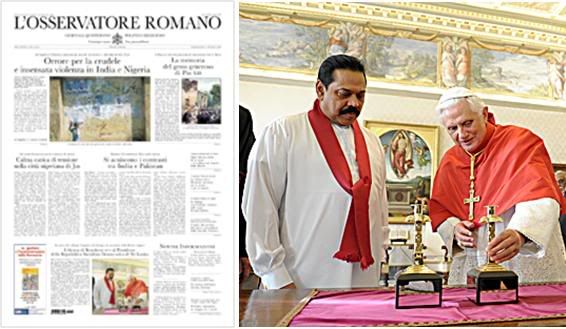
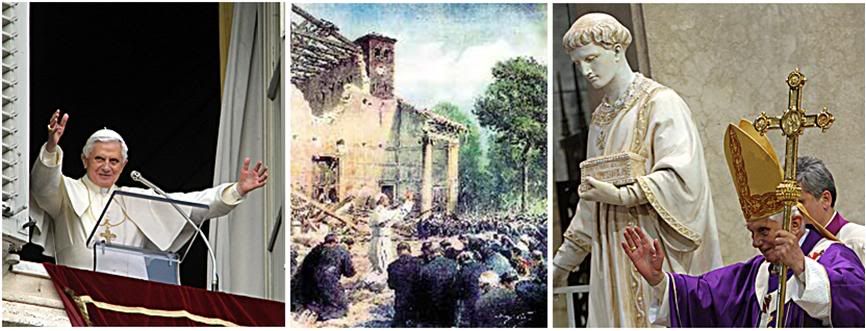
At the Sunday Angelus, the Pope condemns terrorism and new conflict:
'Horror at the crude and senseless violence in India and Nigeria'
Other Page 1 stories: The Pope remembers Pius XII's wartime gesture, during pastoral visit to San Lorenzo fuori le Mura; follow-up stories to the Mumbai terror siege and the new conflict in Nigeria; the Pope's audience for the president of Sri Lanka (top photo, right); and teasers for inside-page stories on ecumenism with the Orthodox Church on the occasion of St. Andrew's Day on Nov. 20.
No events scheduled for the Holy Father today (Tuesday).
|
 03/12/2008 07:42 03/12/2008 07:42 |
|
| | | OFFLINE | | Post: 15.868 | Registrato il: 28/08/2005
| Utente Gold | |
|
 JESUS OF NAZARETH,
JESUS OF NAZARETH,
Russian edition,
presented in Moscow
Translated from
the 12/3/08 issue of

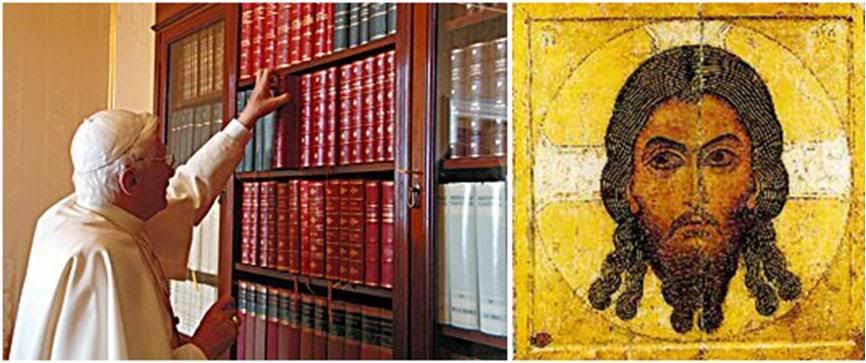
The secular publishing house Azbuka took the initiative for the Russian translation of Joseph Ratzinger/Benedict XVI's JESUS OF NAZARETH. The book was presented December 2 in Moscow at the Library of the Spirit Cultural Center.
Here are the texts of the speeches made at the presentation by the Archbishop of the Mother of God Cathedral in Moscow, Mons. Paolo Pezzi, and the Apostolic Nuncio to Russia, Mons. Antonio Mennini.
A testimony to secularity
by Mons. Paolo Pezzi
Archbishop of the 'Mother of God' Cathedral, Moscow
Jesus of Nazareth. Perhaps there is no other subject about whom more books have been written. For more reason, then, the book by Papa Ratzinger has exceptional value.
I would like to dwell on at least two reasons for this.
The first is the 'exceptionality' of the book itself, which is perhaps what has aroused the most curiosity among those present today: that its author is not just one of the greatest of living theologians, but as everyone knows, is also the Pope.
And this leads to a fascinating paradox: that it was written by a Pope but not as Pope. It is the Pope who wrote it, but not, so to speak, ex cathedra, but rather as a simple believer, a passionate scholar who all his life has tried to deepen his personal knowledge of Jesus and the reasons for his faith in him.
In the preface to the book, he himself clarifies what this means: He asks that his book not be considered as a 'magisterial act', rather "only as an expression of my personal search for the face of the Lord" (cfr Ps 27,8).
I think these words are fundamental for understanding the spirit of this work. It is, we can say with another paradox, is a singular testimony, in a certain sense 'unprecedented', of 'secularity' - if by this we mean, based on the etymology of the word, the fact that the writer has decided to place himself at the level of his interlocutor, of the people ('laos', the root word, means people) to whom the book is addressed.
He does not presume on the assent and adherence of the reader, out of acquiescence to authority, of something coming from 'higher up', but subjects himself to the 'tribunal' of reason and the heart of readers, even if he asks in turn that they should be sincerely open and free of prejudices.
And so, I would say that the Pope's proposition has a double aspect: of humility as well as audacity.
Humility, because the author, willing to forgo his institutional role, accepts being exposed to the test of reason and critique from his readers.
Audacity, because he is convinced of the 'foundedness' of what he writes, therefore he is willing and wants to take the risk of such an exposure, by making the challenge: "Everyone is free to contradict me," he writes. "All I ask is an earnest of sympathy without which understanding is not possible."
It can be shown, even if this is not the place to do so, that this double aspect corresponds, in the thinking of this Pope, to the nature itself of Christian testimony in the world: it is always humble and audacious, just as the testimony offered by its Lord Jesus.
The God of the Bible is a God who brings himself close to man, so close that he takes on a human face and a human voice; so close as to become a man who speaks with human words. But precisely because he wants to persuade us with 'human words', he is also a God who can be 'questioned'.
In this sense, Jesus is, for Ratzinger, the first teacher "who leaves us free to contradict him" and who "only asked for an earnest of sympathy without she no understanding is possible". Jesus was the first to expose himself to the risk of being contradicted, precisely because he did not present himself with the weight of his divine majesty, but simply showed men his own testimony, in words and works, placing himself sincerely under judgment by men's hearts to the point that he accepted their death sentence.
So, I think that with his book, the Pope offers us, above all, a courageous example of what it means to be a witness to the Gospel, in a world that has become largely indifferent, if not hostile, to the Christian announcement.
Announcing Christ, inorder to truly move and challenge hearts both far and near, should always be a personal risk, an exposing of oneself to the judgment and criticism of the world.
In this risk, the Christian is not alone, but is united with the entire body of the Church. Nonetheless, the individual Christian must play his part, if he really wants to be an effective witness, a martyr if need be. Because a martyr is he who has the courage to risk himself, to take on before the world personal responsibility for his faith. It is he who does not fear 'trial' by the world but rather desires to be confronted.
This first aspect, which has to do with the literary genre of this book - as a testimonial that is both scientific and personal, rational and emotional - leads me to the second reason for its exceptionality, which has to do with its contents.
Those who are not 'initiates' or familiar with Biblical research may well wonder why I make a point about the audacity of this work. Where, they ask, is the challenge and the personal risk to the author?
In fact, anyone who has a minimum awareness of the scientific debate which characterized Biblical studies in the century that has just passed, knows that Pope Benedict's central thesis is audacious - even if there is no lack of great contemporary Biblicists, cited in the book, with whom the Pope feels himself to be on the same wave length (as, for instance, the Lutheran Martin Hengel) [who was one of two Biblical experts invited as resource persons to the last Ratzinger Schuelerkreis seminar in Castel Gandolfo].
The Pope announces his thesis right away in the Preface, with his characteristic simplicity and an apparently ingenuous candor: "I have faith in the Gospels... I wanted to attempt presenting the Jesus of the Gospels as the real Jesus, the 'historical Jesus'".
This statement in itself corresponds to what the Church has always believed. There is nothing extraordinary about it. Nonetheless, after quite a broad part of Biblical studies, including those by Catholic scholars, in the past six decades, succeeded in casting doubt on this fundamental conviction, with varying degrees of radicality, the Pope's statement can no longer be called 'customary'.
This is certainly not the place to examine this complex topic in depth, for which I recommend reading the Preface of the book.
But I do wish to comment on the synthesis that the Pope expresses right away at the start of the book, in drawing up a balance sheet of the results from Biblical research in the past few decades.
He noted that notwithstanding the effort for scientific rigor that characterizes the historico-critical method and its most precious positive contributions, the final result of all that tremendous work is a kaleidoscope of theses which contradict each other.
All the so-called historically 'true' (versions of) Jesus claimed to have been 'discovered' beneath the 'mythic' veil of the Gospel - from Jesus the great moral teacher, to Jesus the revolutionary, to Jesus the apocalyptic prophet - have ended up contradicting and annulling each other and have given rise to great confusion.
But these interpretations had one thing in common: a fundamental mistrust of the reliability of the Gospels. That "the common result of all these attempts", the Pope writes, "was the impression that we know little that is certain about Jesus and that it was only afterwards that faith in his divinity had shaped his image. This image, in the meantime, has profoundly penetrated the common consciousness of Christianity. Such a situation is tragic for the faith because it makes its authentic point of reference uncertain: intimate friendship with Jesus, on which everything depends, is left floundering in the void."
I think that this citation brings to light the true theme of this book and the profound motive that led its author to write it.
Why a book on Jesus then? Because the Pope is convinced that today, there is a risk of taking away from before the eyes of men - from the atheist as well as the believer - the one thing that for 2000 years has made Christianity interesting for the most diverse of men: Jesus.
As the French writer Charles Peguy wrote prophetically, at the beginning of the previous century: "We could be the first - the first after Jesus to be without Jesus."
I think that the Pope, a profound and fine connoisseur of the spirit of our time, realizes that post-modern man now finds himself in the situation Peguy described - "the first after Jesus to be without Jesus".
Not without Jesus the teacher of morals, teacher of values. Because such a Jesus does not bother anyone. But without Jesus of the Gospels, Jesus Son of God, Jesus who resurrected his friend Lazarus, and who later dies and then resurrects for all of us.
But if Jesus is not the Jesus of the Gospels - here is the point - if that man who was crucified in Palestine 2000 years ago is not the Son of God, then it means that Christianity and the Church no longer have anything truly decisive to say and give to the world. And man is alone again as he was before Jesus came to earth.
Another great prophet in our time, Feodor Dostoevsky, expressed all this admirably: "Faith is reduced to this anguishing problem: can an educated man, a European of our time, believe, truly believe, in the divinity of Jesus Christ?"
Well, Papa Ratzinger's book was written by an educated man (very educated), by 'a European of our time' who knows and has lived from the inside, as a protagonist, the anguish of the confrontation between science and faith in our time.
But he has emerged stronger from this anguish and enriched in the reasons for his faith, and this is what he wants to communicate.
Because faith does not fear science. And this is the other great message of this book.
Thus, the Jesus that Ratzinger presents is the Jesus of tradition, who at the same time, seems new, like a 'restored' icon, or like gold which has been purified by fire and gleams brighter than before.
Just one example: the dialog at a distance that the Pope had with the New York Rabbi Jacob Neusner, in the stunning chapter on the Sermon on the Mount.
Rabbi Neusner, one of the great Jewish erudites of our time, wrote many years ago an important book on Jesus, in which, after sincerely confronting the words of the teacher from Nazareth, he explains with great precision and honesty the reason why he rejects Jesus as the Messiah awaited by the Jews: the reason is simply that by his own words, Jesus puts himself at the level of God and the Law, which, as an observant Jew, is something he cannot accept.
Ratzinger considers Neusner's testimony valuable, because it shows effectively a fact that is very dear to the theologian Pope, something that is often contested by many exegetes: namely, that the figure of the man Jesus, on the basis of his words alone, becomes incomprehensible if one does away with his 'foolish' claim to be God's equal. Just as his self-condemnation to death becomes incomprehensible.
Jesus is incomprehensible if one eliminates his claim to be the "Son" - to use the expression most loved by Papa Ratzinge - who enjoys an unequalled intimacy with God because he is one with him.
Certainly one can, like Rabbi Neusner does, reject this claim as unacceptable, as blasphemy. And certainly one can 'not believe' in what the Gospels recount. Science by itself can never produce faith, the Pope knows that very well.
And yet, here is the great challenge posed by the book - not only is science not up to contesting the central nucleus of the image of Jesus that emerges in the Gospels, but this image itself, after two centuries of minutious scientific archeology into the texts, continues to stand, and ultimately, the Pope says, appears to be the most 'sensible and convincing', 'the most plausible'.
He writes further: "I am convinced that this figure is much more logical and, from the historical viewpoint, even more understandable than the reconstructions that we have had to confront in the past decades. I maintain that this Jesus - the Jesus of the Gospels - is a historically sensible and convincing figure. Only if something extraordinary had happened, if the figure and the words of Jesus had radically bypassed all the hopes and expectations of his time, can his crucifixion be explained."
With all this, I do not mean to give the impression that this is a scientific book in the technical sense, and thus, arid. On the contrary, the other great value of this portrait of Jesus of Nazareth, is that every page shines with the love of the person who wrote it, the emotion of his gaze that is enraptured by the beauty of the Face that he beholds.
Despite the difficulty of some of its most demanding pages, one never loses the feeling that the Pope is describing the Face of a living Person, the Face of Someone whom he knows as one knows a friend.
Christianity is indeed, first of all and above all, the encounter with Jesus, in wonder before the human face of God, of the God who is near and who is a friend, that God "who loved me and gave himself for me", as the Apostle Paul wrote so movingly.
The royal way to knowledge
by Mons. Antonio Mennini
Apostolic Nuncio to Russia
Allow me, on this occasion, to briefly note some leading ideas in the thought of Benedict XVI that seem to me well exemplified by his recent discourse in Paris, at the College des Bernardins, in a surprising cultural and pedagogic continuity with his lectures at Regensburg (reason as the point of encounter for all men) and that prepared for delivery at La Sapienza University in Rome (faith as a complement of reason and the custodian of truth, not as an abstraction or theory, but as an experience lived over the centuries).
With respect to the first two, the experience of faith was, in Paris, exemplified paradigmatically in monasticism.
I wish to note above all that this insistence on the concrete dimension of truth as an integral experience (not forgetting that in Russian, virginity or chastity, which is characteristic of monasticism, is called 'integral wisdom') is very close to Oriental sensibility.
In Vladimir Soloviev, for example, knowledge through faith is presented as the royal way to knowledge, where the term 'royal way' explicitly recalls monastic life and its principal characteristic, which is leading man to abandon dissipation in order to unite himself to God alone, "so that the man who wants to know reality in all its facets, but without dissipation, vices, excesses, fantasies or vain thoughts, should follow not the private, tortuous and dangerous way of his own opinions, but that which has already been traced, which leads directly to the Lord of reality under whose mastery everything is found."
Starting with the formula Quaerere Deum, which synthesizes the monastic experience in the West, as the Pope described it at the College des Bernardins, as well as in the Christian East, Benedict XVI treats the subject of artistic creation and beauty in terms of the relationship between 'blind fact' and 'fact which is Logos itself' ("The novelty of the Christian message does not consist in a thought but in a fact which manifested itself. Not as blind fact, but fact which is Logos itself - the presence of eternal Reason in our flesh. Verbum caro factum est (John 1,14): thus, in fact, there now is Logos, present in our midst. Fact is reasonable").
I would say that this last aspect is of fundamental importance today, if one thinks of the senselessness and despair dominant in post-modern culture which, in an era of globalization like ours, characterizes Europe and the West, and now, also in large part, Russia.
In the light of this, it is understandable that Benedict XVI dedicated his first two encyclicals to Love and to Hope, placing before man the question Christ addressed to his first two disciples, "What are you looking for?" (Jn 1,38) - a question that translates the immensity of human desire.
The hope that Benedict XVI proposes to his listeners and his readers - Christian hope - is none other but human desire taken seriously at its profound root, in its potent dynamism urged by the infinite.
Benedict XVI's appeal to 'widen reason', to 'widen desire', constitutes a challenge to verify if the proposition of Christ, living and present in his Church, responds to man's eternal thirst - as Cesare Pavese has described it, "that which man looks for in pleasure is an infinite, and no one would ever renounce the hope of achieving this infinite".
And it is only our freedom, the freedom of the single person, measuring himself in a close and frank dialog with the person of Christ, that can find the right answer - on which our happiness depends, and perhaps, the future of the world itself.
Later, AsiaNews had this report on the Msocow event:
W Russian edition of Benedict XVI's
'Jesus of Nazareth' presented in Moscow

Moscow, Dec. 3 (AsiaNews) - The Cultural Center Library of the Spirit in Moscow has hosted the presentation of the Russian edition of "Jesus of Nazareth" by Benedict XVI.
Speaking at the event on December 2 were Fr. Igor Vyžanov, secretary of the department for external relations at the patriarchate of Moscow, Archbishop Paolo Pezzi, apostolic nuncio Archbishop Antonio Mennini, and the director of the Azbuka publishing house, Denis Veselov.
The initial printing of the book, 20,000 copies, reveals the publisher's expectations for the Pope's book.
Veselov explains: "We published it because it seemed to us an important book for everyone, which takes us back 1,000 years ago, when divisions were outweighed by a common Christian identity, when we were all Christians."
The theologian Ratzinger is not unknown to the Russian public. In 2006, his Introduction to Christianity was published by the Library of the Spirit in Moscow, with a preface by Metropolitan Kirill, president of the department for external relations at the patriarchate of Moscow.
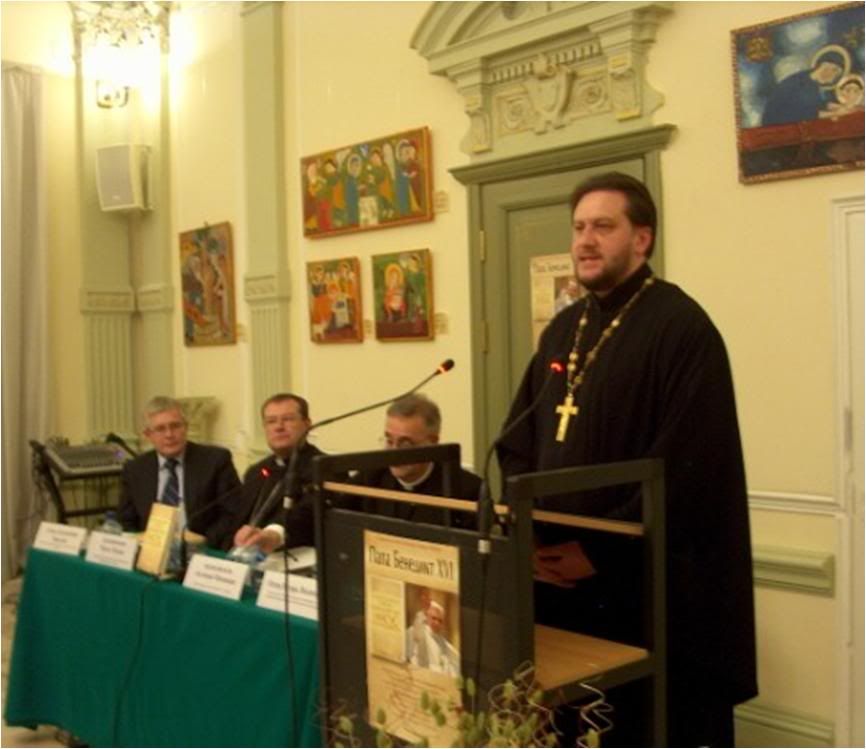
Fr. Igor Vyžanov (speaking, in photo) hailed the decision of the Azbuka publishing house, connecting it to the previous one in 2006, which indicates the terrain on which authentic ecumenism can grow.
In this regard, the representative of the patriarch of Moscow explained: "I often participate in international encounters or forums with other Christians, but too often they talk about the consequences of Christianity - protection of the environment, the cultural problem (which are certainly important) - but they forget that the foundation of everything is Christ. This book brings us back to the center of our faith."
Archbishop Pezzi, presenting the contents of the volume and replying to the questions of the public, emphasized the "fascinating paradox" of Jesus of Nazareth, written by the Pope, as both an ordinary believer and an impassioned scholar, "who for his entire life has striven to deepen his personal knowledge of Jesus and the reasons for his faith in Him."
Highlighting the relevance of the witness given by the pope's book, the archbishop affirmed that " Jesus of Nazareth is the book of a 'European of our time' who has seen and lived from the inside, as a protagonist, the difficult travail of the encounter-clash between science and faith unique to our time. But from this travail he emerged strengthened and enriched in the reasons of his faith, and so he wants to communicate these to us."
Archbishop Mennini emphasized the centrality of the relationship between faith and reason in the book, and more generally in the teaching of Benedict XVI.
The nuncio called attention to the common thread that connects, in this sense, the addresses of the Pope in Regensburg, at the La Sapienza University of Rome, and at the Collège des Bernardins in Paris.
Placing Jesus of Nazareth beside a classic like The Lord by Guardini, Archbishop Mennini then emphasized some points of harmony between Ratzinger's thought and the Eastern Christian tradition: these include love of monasticism and insistence on the truth as an integral experience.
[Modificato da TERESA BENEDETTA 07/12/2008 00:14] |
 03/12/2008 13:19 03/12/2008 13:19 |
|
| | | OFFLINE | | Post: 15.869 | Registrato il: 28/08/2005
| Utente Gold | |
|

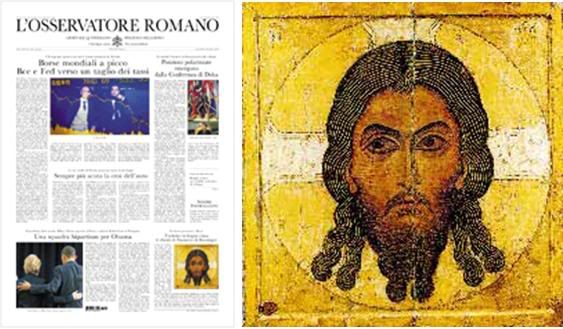 The only papal news in today's issue is the presentation of the Russian edition of the Holy Father's
The only papal news in today's issue is the presentation of the Russian edition of the Holy Father's
book JESUS OF NAZARETH (see story translations in the preceding post). The three main stories are on
the move towards tax cuts by both the European Union and the US government; polarized positions taken
at the Doha conference on aid to developing nations; and the growing crisis in the US auto industry. There
is a story about Barack Obama's new national security team with Hillary Clinton as Secretary of State
and President Bush's Defense Secretary Robert Gates staying on.
THE POPE'S DAY
General Audience - The Holy Father's catechesis is on the relationship between Adam,
the first man, and Christ, in St. Paul's preaching.
[Modificato da TERESA BENEDETTA 05/12/2008 00:28] |
 03/12/2008 13:48 03/12/2008 13:48 |
|
| | | OFFLINE | | Post: 15.870 | Registrato il: 28/08/2005
| Utente Gold | |
|
 GENERAL AUDIENCE TODAY
GENERAL AUDIENCE TODAY
The Holy Father's catechesis was about St. Paul's preaching on original sin and the relation between Adam, the first man, and Christ.
Here is how he synthesized it in English:
In our continuing catechesis on Saint Paul, we now consider the Apostle’s teaching on the relation between Adam, the first man, and Christ, the second Adam (cf. 1 Cor 15:22.45; Rom 5:12-21).
Paul’s teaching on the sin of Adam and its disastrous consequences for the human family is meant to emphasize the surpassing gift of grace bestowed on humanity by Jesus Christ.
Seen in this light, the doctrine of original sin explains the misery of our human condition, yet Paul also underlines the moral responsibility of each man and woman for this tragic reality.
"All have sinned", the Apostle tells us, "and all fall short of the glory of God" (Rom 3:23). Yet now, by faith in Christ, we have been justified and are at peace with God (cf. Rom 5:1).
Christ, the new Adam, by his obedience to the Father’s will, has set mankind free from the ancient burden of sin and death. In Baptism, he has given us a share in his saving death and resurrection, and made us adoptive children of the Father.
The new life and freedom which we have received by the grace of Christ impels us to bear witness to the sure hope that all creation will be freed from its bondage to corruption, and share in the glorious freedom of the children of God (cf. Rom 8:19ff.)
Later, addressing the Italian faithful, he had these special words to a bankers group:
I greet the representatives of the Cooperative Credit Bank of Lametino. Your presence, dear friends, gives me the opportunity to highlight - especially in these times of difficulty for so many families - one of the primary objectives of banking and credit institutions, which is, solidarity with the weakest sectors of society and support for productive activity.
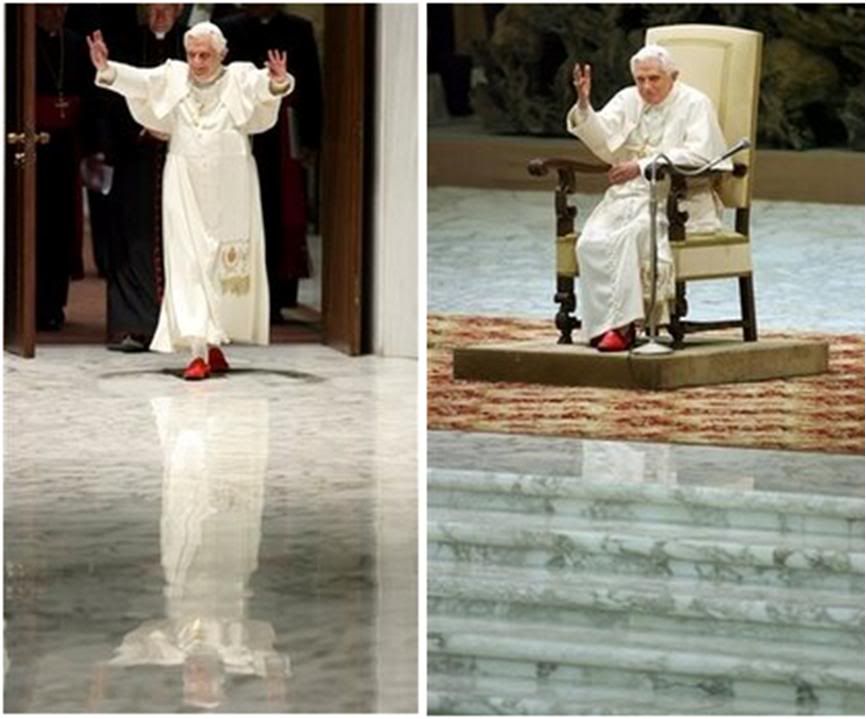
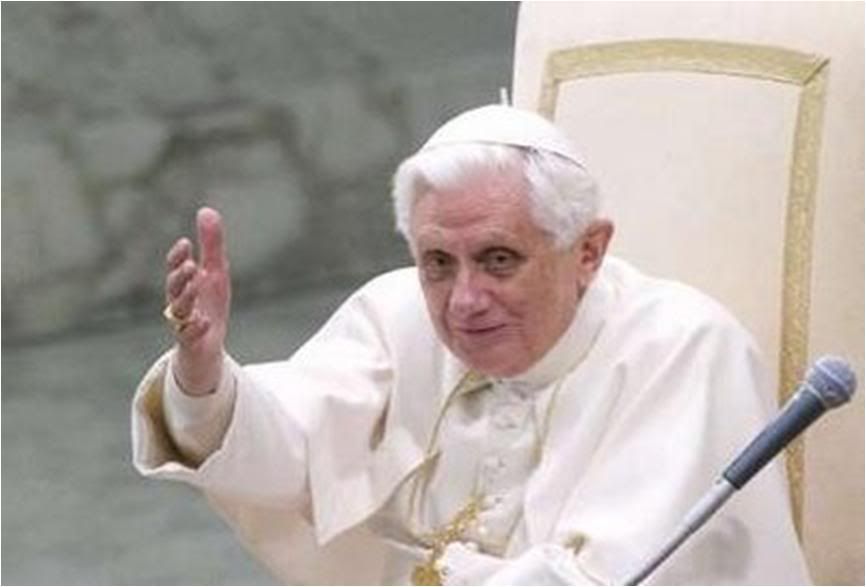 Here is a translation of the full catechesis:
Here is a translation of the full catechesis:
Catechesis #14, Pauline Year Cycle
Dear brothers and sisters,
In today's catechesis, we will dwell on the relationship between Adam and Christ, delineated by St. Paul in the famous page of the Letter to the Romans (5,12-21), in which he hands down to the Church the essential lines of the doctrine on original sin.
For convenience, here is the full citation:
12 Therefore, just as through one person sin entered the world, and through sin, death, and thus death came to all, inasmuch as all sinned --
13 for up to the time of the law, sin was in the world, though sin is not accounted when there is no law.
14 But death reigned from Adam to Moses, even over those who did not sin after the pattern of the trespass of Adam, who is the type of the one who was to come.
15 But the gift is not like the transgression. For if by that one person's transgression the many died, how much more did the grace of God and the gracious gift of the one person Jesus Christ overflow for the many.
16 And the gift is not like the result of the one person's sinning. For after one sin there was the judgment that brought condemnation; but the gift, after many transgressions, brought acquittal.
17 For if, by the transgression of one person, death came to reign through that one, how much more will those who receive the abundance of grace and of the gift of justification come to reign in life through the one person Jesus Christ.
18 In conclusion, just as through one transgression condemnation came upon all, so through one righteous act acquittal and life came to all.
19 For just as through the disobedience of one person the many were made sinners, so through the obedience of one the many will be made righteous.
20 The law entered in so that transgression might increase but, where sin increased, grace overflowed all the more,
21 so that, as sin reigned in death, grace also might reign through justification for eternal life through Jesus Christ our Lord.
Actually, in the first letter to the Corinthians, writing on faith in the resurrection, Paul had already introduced the comparison between the progenitor and Christ. "For just as in Adam all die, so too in Christ shall all be brought to life...'The first man, Adam, became a living being', the last Adam a life-giving spirit" (1 Cor 15,22.45).
With Rom 5,15-21, the comparison between Christ and Adam is more articulated and illuminating: Paul reviews the story of salvation from Adam to the Law, and from there to Christ. At the center is not so much Adam with the consequences of sin on mankind, as much as Jesus Christ and the grace which, through him, is poured in abundance on mankind.
The repetition of 'how much more' about Christ underlines how the gift received in him surpasses by far the sin of Adam and the consequences it produced on mankind, such that Paul can conclude with "But where sin increased, grace overflowed all the more" (Rm 5,20). Thus, the comparison that Paul traces between Adam and Christ highlights the inferiority of the first man with respect to Christ.
On the other hand, it is precisely to place in evidence the incommensurable gift of grace, in Christ, that Paul refers to Adam's sin: one might say that if it were not to demonstrate the centrality of grace, he would not have put off discussing sin which "through one person, entered the world, and with sin, death" (Rm 5,12).
Thus, if in the faith of the Church, the awareness of the dogma of original sin matured, it is because it is connected inseparably with the other dogma, that of salvation and of freedom in Christ.
The consequence is that we should never consider the sin of Adam and mankind in a way detached from the salvific context, that is, without understanding it within the horizon of justification in Christ.
But as men of today we should ask ourselves: what is original sin? What does St. Paul teach, what does the Church say? Is this doctrine still sustainable today?
Many think that, in the light of the story of evolution, there is no longer place for the doctrine of original sin that then spread itself over the whole history of mankind. Consequently, even the question of redemption and the Redeemer would lose its foundation.
So, does original sin exist or not? To be able to answer, we should distinguish two aspects of the doctrine on original sin. There is an empirical aspect, that is, a concrete reality, that is visible, I would say, tangible to all. And there is the aspect of mystery which concerns the ontological basis of this fact.
The empirical fact is that there exists a contradiction in our being. On the one hand, man knows that he must do good, and intimately, he wants to do good. But at the same time, he also feels the impulse of doing the opposite, of following the road of selfishness, of violence, of doing what he pleases even if he knows it would be acting against good, against God, against neighbor.
St. Paul in his Letter to the Romans, expressed this contradiction in our being thus: "The willing is ready at hand, but doing the good is not. For I do not do the good I want, but I do the evil I do not want" (7,18-19). This interior contradiction in our being is not a theory. Each of us experiences it everyday. And above all, we always see around us the prevalence of this second will. Just think of the daily news on injustice, violence, lies and lust. We see it everyday; it is a fact.
As a consequence of this power of evil on our spirits, a filthy river has formed which poisons the geography of human history. The great French thinker Blaise Pascal spoke of a 'second nature' which is superimposed on our original nature which is good. This 'second nature' makes the bad appear as normal to man. Thus even the usual expression "This is human" has a double meaning.
"This is human" can mean: this man is good, he acts as a man should act. But it can also mean falsehood: evil is normal, it is human. Evil seems to have become second nature.
This contradiction in the human being, in our history, should provoke, and does provoke, even today, a desire for redemption. In fact, the desire that the world may change, and that the promise that a world of justice, peace, good will be created, is everywhere.
In politics, for instance, everyone speaks of this need to change the world, to create a more just world. This, in itself, is an expression of the desire for a liberation from the contradiction that we experience in ourselves.
Thus, the fact of the power of evil on the human heart and in human history is undeniable. The question is: how do we explain this evil? In the history of ideas, outside the Christian faith, there is a principal explanation, with many variations.
This model says: being is itself contradictory, it carries good as well as evil. In the ancient world, this idea implied that there were two equal and original principles: a good principle and a bad one. This dualism was supposedly insurmountable. The two principles are on the same level, therefore there would always be, from the origin of being, this contradiction.
And so the contradiction in our being simply reflects the opposition of the two divine principles, so to speak. In the evolutionist atheist version of the world, the same vision returns in a new way, even if, in this concept, the vision of being is monistic: it supposes that the being as such carries in itself both good and bad from the very start.
Being itself is not simply good, but open to both good and bad. Evil is just as original as good. And human history would develop only the model already present after all preceding evolution.
And that which Christians call original sin is only the mixed nature of being, a mixture of good and evil which, according to this theory, belongs to the same matter as being.
This is a vision which is basically desperate: if it were so, then evil is invincible. At the end, all that counts is self-interest. And every progress would necessarily have to be paid with a river of evil, and whoever would like to serve progress must agree to pay this price.
Politics, basically, is based on these premises - and we see the effects. This modern thinking can, in the end, only create sadness and cynicism.
So we ask again: what does faith tell us, as testified by St. Paul? First, it confirms the fact of competition between the two natures, the fact of this evil whose shadow hangs over all creation.
We heard Chapter 7 of the Letter to the Romans, and we can add Chapter 8. Evil exists, simply. As an explanation, and in contrast with the dualisms and monisms that we briefly looked at and found desolating, faith tells us: there are two mysteries of light and one of night, which, however, is wrapped up in the mysteries of light.
The first mystery of light is this: faith tells us that there are not two principles, one good and one evil, but only one principle, the Creator God, and this principle is good, only good, without a shadow of evil. And so, even being is not a mixture of good and evil; being as such is good, and therefore, it is good to be, it is good to live.
This is the happy announcement of faith: there is only a good source, the Creator. And therefore to live is good, it is good to be a man, a woman. Life is good.
Then comes the mystery of darkness, of night. Evil does not come from the source of being itself - it is not equally original. Evil comes from a created freedom, from an abused freedom.
How was it possible? How did it happen? This remains obscure. Evil is not logical. Only God and good are logical - they are light. Evil remains mysterious. It is presented in great images, as in Chapter 5 of Genesis, with the image of the two trees, the serpent, the sinning man. A great image that makes us guess but cannot explain what is in itself illogical.
We can guess but not explain. Nor can we say why one is next to the other, because it is a more profound reality. It remains a mystery of darkness, of night.
But there is soon another mystery of light. Evil comes from a subordinate source. God with his light is stronger. And so, evil can be overcome. And the creature, man, can be healed.
The dualistic visions, even the monism of evolutionism, cannot say that man can be healed; but if evil comes only from a subordinate source, it remains true that man can be healed. And the Book of Wisdom says, "The creatures of the world are wholesome' (1,14).
Finally, man not only can be healed - he is healed, in fact. God introduced healing. He entered history in person. To the permanent source of evil, he opposes a source of pure goodness. Christ crucified and resurrected, the new Adam, opposes the filthy river of evil with a river of light.
And this river is present in history: we see the saints, the great ones, but also the humble saints, the simple faithful. We see that the river of light that comes from Christ is present and is strong.
Brothers and sisters, it is Advent time, In the language of the Church, the word Advent has two meanings: presence and waiting.
Presence: light is present, Christ is the new Adam, he is with us and among us. Already the light shines, and we should open the eyes of the heart to see the light and to introduce ourselves into the river of light.
Above all, be grateful for the fact that God himself entered history as the new source of good.
But Advent also means waiting. The dark night of evil is still strong. And so, let us pray in Advent with the ancient people of God: Rorate caeli desuper [Drop down, dew from heaven].
And let us pray with insistence: Come, Jesus. Come, give strength to the light and to goodness; come where lies, ignorance of God, violence and injustice dominate; come Lord Jesus, give strength to the good in this world and help us to be bearers of your light, workers of peace, witnesses of truth. Come Lord Jesus!
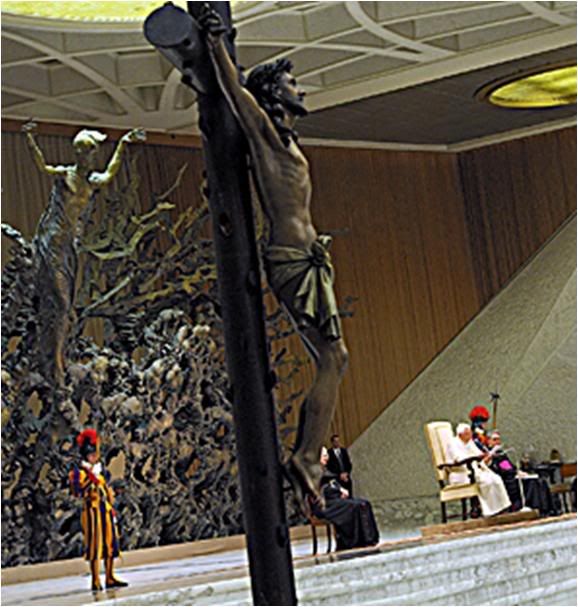
[Modificato da TERESA BENEDETTA 04/12/2008 13:15] |
 03/12/2008 14:54 03/12/2008 14:54 |
|
| | | OFFLINE | | Post: 15.871 | Registrato il: 28/08/2005
| Utente Gold | |
|
 For the second day in a row, the Vatican has expressed its opposition to a United Nations initiative, and in both cases, despite a clear statement of the specific reason for the opposition, the Italian media have chosen to ignore the explanations to focus on the misleading headlines that the Vatican opposes rights for homosexuals and for disabled persons, respectively. A clear distortion of the Vatican position, as usual.
For the second day in a row, the Vatican has expressed its opposition to a United Nations initiative, and in both cases, despite a clear statement of the specific reason for the opposition, the Italian media have chosen to ignore the explanations to focus on the misleading headlines that the Vatican opposes rights for homosexuals and for disabled persons, respectively. A clear distortion of the Vatican position, as usual.
This item today in L'Occidentale places the news in the right perspective.
Anyone who says the Church is intolerant
can only do so in bad faith
by Stefano Fontana
Translated from

December 3, 2008
The position taken by the Catholic Church to the proposed 'decriminalization of homosexuality' presented by French president Nicolas Sarkozy cannot surprise anyone except those who are acting in bad faith.
The reason is very simple: the proposal not only means 'decriminalization' but the inclusion of homosexuals among the categories to be protected against hate crimes on the same level as racism and religious intolerance.
The Sarkozy proposal, in other words, identifies homosexuality with homosexuals - the act with the person - indicating that one cannot be against homosexuality without being against homosexuals, i.e., whoever is against homosexuality is also against homosexuals.
But the Church position is also that of anyone who simply uses reason. One can maintain that homosexuality is a disorder, as Benedict XVI and the Church have called it, but affirm at the same time that homosexuals have the same dignity as every other person and deserve the same respect.
Homosexuality is not the only human disorder, of which each of us possess a number and tolerate quite a few. Nor is it the most serious of disorders. But it is a disorder and it is a duty for everyone not to transform a disorder into normalcy.
Homosexuality is not to be promoted or taught as an indifferent sexual choice, and the homosexual couple cannot be equiparated juridically to the traditional family, and should not be allowed to adopt children.
All this does not contradict asking respect for homosexuals, and from the Christian point of view, for loving them as brothers. [As Christ loved prostitutes and other sinners.]
Yesterday, the Holy See also stated it will not sign the Untied Nations convention on the rights of disabled persons. Again, it is not that the Church opposes rights for disabled persons. Obviously not.
But the fact is that the convention also establishes the mother's right to 'reproductive health' in case the fetus is disabled or malformed. In practice, this 'right' opens the door to eugenetic abortion, which the Church cannot accept.
Conventions and laws have many aspects. Since the Church maintains that one cannot do good through bad means, even if some aspects of law are shared - such as depenalizing homosexuality - others are so strongly negative that the Church cannot accept them and must alert the faithful against present and future dangers resulting from such negative aspects.
We Europeans, among others, have a long experience in this respect, The European Parliament has tried many times to force its member states to extend juridical recognition to gay couples, directly equiparating homophobia with racism, intolerance and even Zionism.
Thus, the probability that the Sarkozy proposal, if approved, becomes a tool to stigmatize the states that do not recognize gay marriage as intolerant and in violation of the Universal Declaration of Human Rights, is ominously close.
To compare Iran, which imprisons homosexuals, and Italy, which is against the juridical recognition of gay marriages, is a rash logical leap which the Sarkozy proposal would nonetheless promote.
It still is not clear to most what the Church cannot accept equivalence of homosexuality with heterosexuality. The fundamental reason is that the origin of human society is a male and female couple, not two asexual or indifferently sexed individuals.
The social meaning of sexuality has been forgotten and privatized by individualistic morality which is widely publicized in the consumer society - two phenomena which are complementary.
But the Church cannot forget this basic principle. Two individuals who are indifferently sexed - homosexual or trans-sexual - do not complete each other in complementary diversity and are not open to the reception of natural life. In such a set-up, sexuality is individualized and 'technified'.
The Church maintains that if welcoming life - in the form of sexual differentiation and complementarity, and the possibility of two individuals generating life - is not a choice made from the very beginning, then it cannot be reconstituted afterwards.
Society would be a heap of individuals thrown together but not a community. When it is said, sometimes as rhetoric, that the family is the basic cell of society, it means exactly that. A homosexual couple which cannot generate life cannot be this cell, because life would not continue.
I originally posted stories on this issue in CULTURE & POLITICS..., but to give better context to it in this thread, here is how CNS reported on it one day later.
Vatican makes clear why it opposes
a proposed U.N. declaration
on homosexual rights
By Carol Glatz

VATICAN CITY, Dec. 3 (CNS) -- The Vatican has made clear its opposition to the United Nations endorsing a universal declaration to decriminalize homosexuality.
Archbishop Celestino Migliore, the Vatican's apostolic nuncio to the United Nations, and Vatican spokesman Jesuit Father Federico Lombardi said unjust forms of discrimination against homosexuals must be avoided.
However, the Vatican does not approve of a formal declaration with political weight that might be used to put pressure on or discriminate against countries that do not recognize same-sex marriage, they said.
A draft declaration, drawn up by France and endorsed by the European Union, was to be presented to the U.N. General Assembly Dec. 10. It condemns discrimination based on sexual orientation and gender identity.
Archbishop Migliore told the French news agency I.Media Dec. 1 that adding these "new categories (to be) protected from discrimination" would create in turn "new and inflexible (forms of) discrimination."
For example, he said, "states that do not recognize same-sex unions as 'marriage' will be pilloried and put under pressure" to do so.
France, which holds the rotating presidency of the EU, plans to present the proposal on the 60th anniversary of the U.N.'s Universal Declaration of Human Rights in the hope that U.N. member states will make a nonbinding declaration to decriminalize homosexuality.
Almost 80 countries have laws prohibiting homosexual activity and several nations include the death penalty as a form of punishment for such activity.
Father Lombardi said that "obviously nobody wants to defend the death penalty for homosexuals."
The church supports fundamental human rights and opposes every form of "unjust discrimination" which includes "not just the death penalty, but all violent or discriminatory criminal laws against homosexuals," he said in a commentary on Vatican Radio Dec. 1.
The Vatican spokesman made his remarks after Archbishop Migliore's comments were published. He said the archbishop clearly expressed the church's and the Vatican's position.
Father Lombardi said the problem with the draft proposal is that it does not just ask for the decriminalization of homosexuality.
It also includes a declaration that might put pressure on or discriminate against communities that uphold marriage as only being between a man and a woman, the Vatican spokesman said.
Under such a declaration, nations or communities that "do not put every sexual orientation on exactly the same level can be considered contrary to the respect of human rights," he said.
It is no wonder then, he said, that fewer than 50 U.N. member states have endorsed the draft declaration and more than 150 have not signed on.
"The Vatican is not alone" in its opposition to the proposal, he said.
On Dec. 10, the U.N. General Assembly also was to be presented with a petition to make abortion a universally recognized human right.
Archbishop Migliore told I.Media that such a proposal was "sad and outrageous" and represented the kind of "modern savagery that will dismantle our society from the inside out."
The initiative would promote the dismantling of the human-rights system by allowing declarations that are no longer about promoting and protecting fundamental rights but about "personal choices," he said.
[Modificato da TERESA BENEDETTA 04/12/2008 17:41] |
 04/12/2008 10:33 04/12/2008 10:33 |
|
| | | OFFLINE | | Post: 15.873 | Registrato il: 28/08/2005
| Utente Gold | |
|
 Liturgy between
Liturgy between
innovation and tradition
by Fr. Nicola Bux
Translated from
the 12/4/08 issue of

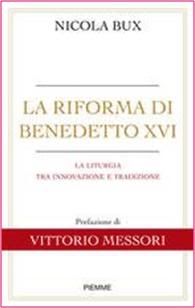 The book La riforma di Benedetto XVI by liturgist Fr. Nicola Bux will be presented Thursday, Dec. 4, in Bari. Here are the conclusions from the book.
The book La riforma di Benedetto XVI by liturgist Fr. Nicola Bux will be presented Thursday, Dec. 4, in Bari. Here are the conclusions from the book.
A new liturgical movement is being born which looks at the liturgies of Benedict XVI. The instructions prepared by the experts are not enough.
What is needed are exemplary liturgies that make us encounter God. Only spirits who are willfully superficial are not aware of this.
There is a new beginning born from the depth of liturgy itself, just as the liturgical movement of the past century which culminated in the Second Vatican Council.
Liturgy as the place for encounter with the living God, not a show to make religion interesting, nor a museum of grandiose ritual forms.
The people of God celebrate the renewed rite with respect and solemnity, but continue to be disoriented by contradictions between the two forms.
Liturgy is becoming once again an ecclesial action, not of specialists and liturgical teams, but of fathers and teachers who, thanks to their knowledge of the sources, see Western liturgy as the fruit of historical development and Oriental lturgy as a reflection of the eternal.
They have opposed the mystification of liturgy, and knowing history, have shown us the multiple forms possible. The Holy Father has taken their legacy and is making it fruitful. He has expressed the hope that the old and new forms of the Roman rite may coexist alongside each other, as the Roman rite has coexisted with the Ambrosian and Oriental rites.
Let us trust him. He is patiently bringing over the wisdom of Catholic imagination into the life of the Church today. He unerstands well that innovation is not hostile to tradition but is part of it like lymph of the Holy Spirit.
He is not a conservator nor an innovator, but a missionary and 'humble worker in the vineyard of the Lord'. In the book JESUS OF NAZARETH, he highlights the 'comprehension' that in the Gospel of Luke - unlike the other Gospels - Jesus shows towards the Israelites: "It seems to me particularly significant," he observes, "how he concludes the story of the new wine and the new or old wineskins. In Mark, one reads - 'No one pours new wine into old wineskins. Otherwise, the wine will burst the skins, and both the wine and the skins are ruined. Rather, new wine is poured into fresh wineskins" (2,22). In Mt 9,17, the text is similar. Luke transmits the same conversation to us, but adds at the end: 'No one who has been drinking old wine desires new, for he says, 'The old is good''(5,39) - an addition which perhaps we may interpret as an expression of understanding for those who wish to stay with 'the old wine'" [pp 216-217).
Is this not applicable to the debate between the usus antiquior and usus novus of the Mass that followed the motu proprio?
Christian liturgy, like the Christian happening itself, is not made by us. A term like actualization has generated the idea that we have the capacity to replicate liturgy, create the right conditions so that this can happen, organize it, alomost as though we were the creators of that which we affirm to believe.
In fact, it is Jesus Christ who makes the sacred liturgy with the Holy Spirit. It is for us to follow, to make room for his work.
The method available to everyone is to look attentively at what is taking place - it used to be called 'assisting' at Mass, from the Latin ad-stare, to be present: to be in his presence. It means adhering to Something that came ahead, to follow that which he does among us, where he is always able to overturn instantly the idea that we create the rite. Liturgy is sacred and divine because it comes from another world.
We would like to understand and celebrate liturgy worthily as the possibility of an encounter with the reality of God, as a motivation for man's moral behavior; to read the degradations symptomatic of spiritual emptiness by showing the way to restore the spirit of unity in the catholic and apostolic faith; to promote a serious debate and an educational way, following the thought and example of the Pope who has taken up the liturgical movement once again.
We should look at the spirit of liturgy as adoration of God, through Jesus Christ, in the Holy Spirit, and as a pedagogy for entering into mystery, and through it, become transformed in morality and sanctity.
It is also an invitation to non-believers who seek the truth, because no one is immune from the doubt that perhaps there exists Someone else to whom one might dedicate time!
On this 'perhaps', which liturgy does not completely uncover - that is why it keeps a sense of the mysterious and sacred - communication can be established between believers and non-believers (or those who believe differently).
|
 04/12/2008 12:28 04/12/2008 12:28 |
|
| | | OFFLINE | | Post: 15.876 | Registrato il: 28/08/2005
| Utente Gold | |
|
 PAPAL PHOTOS OF THE YEAR
PAPAL PHOTOS OF THE YEAR
ACCORDING TO REUTERS
How fast the year has gone by! Already, Reuters has posted its papal Photos of the Year for 2008, and although I would personally choose every photo of Benedict XVI as photo of the year, I find Reuters's choices rather arbitrary and random by almost any criterion, and certainly unrepresentative of the Pope's year (four from the US visit, 1 from WYD-SYD, 3 from the General Audiences, and the photo with Stephen Hawking).
On the plane approaching Washington, DC, 4/15/08:
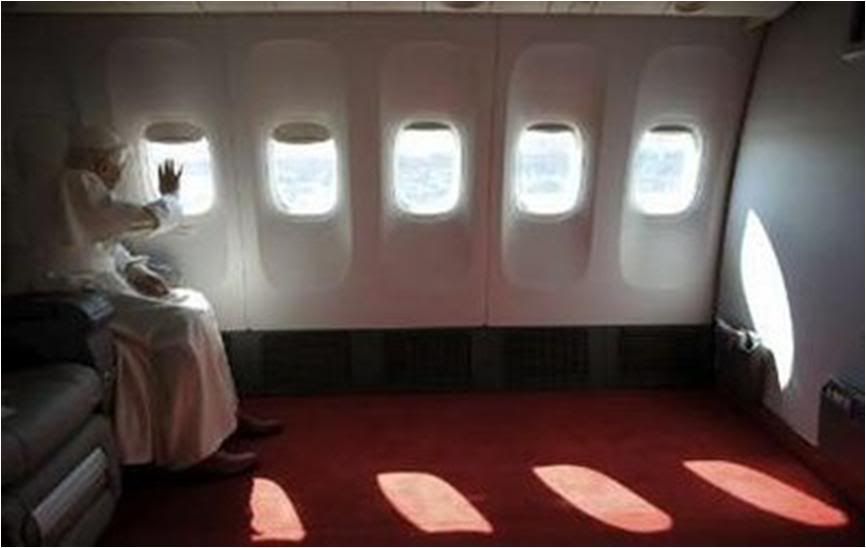
Parade on Fifth Avenue, Manhattan, 4/20/08:
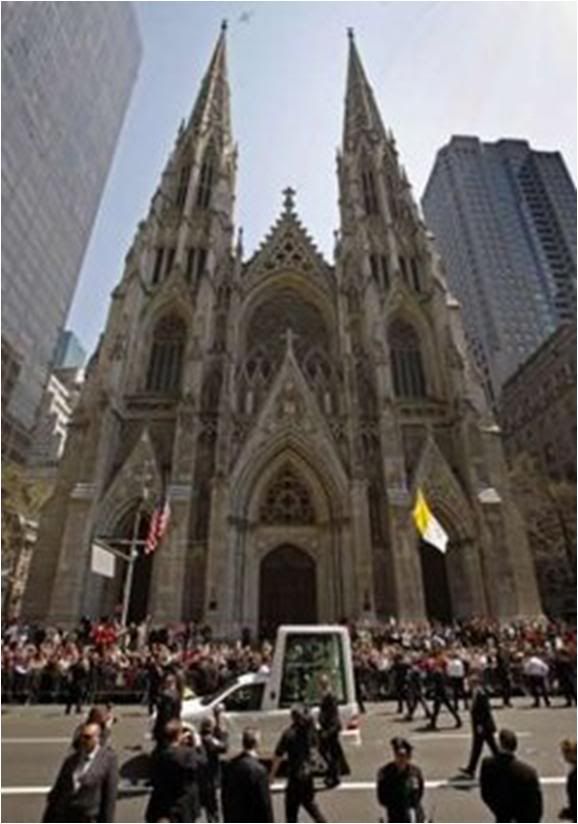
Ground Zero, Manhattan, 4/21/08:
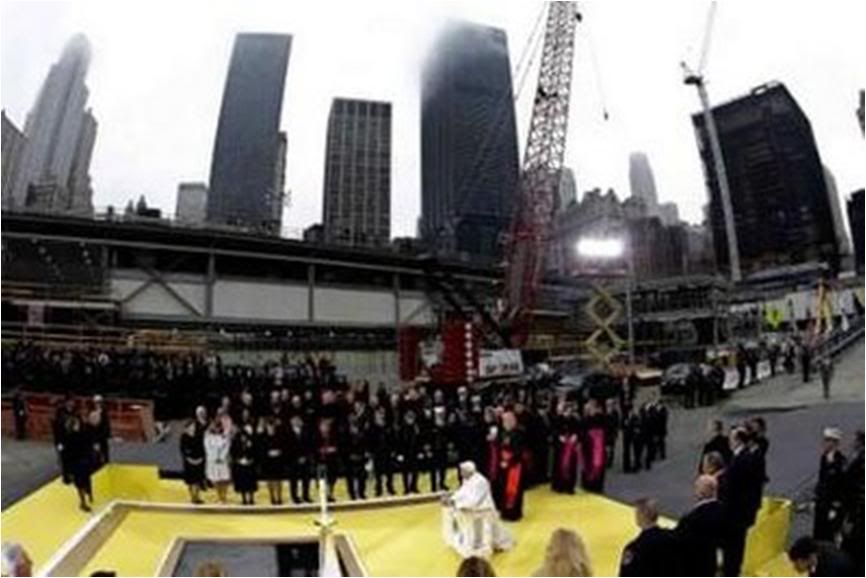
Mass at Yankee Stadium, 4/21/08:
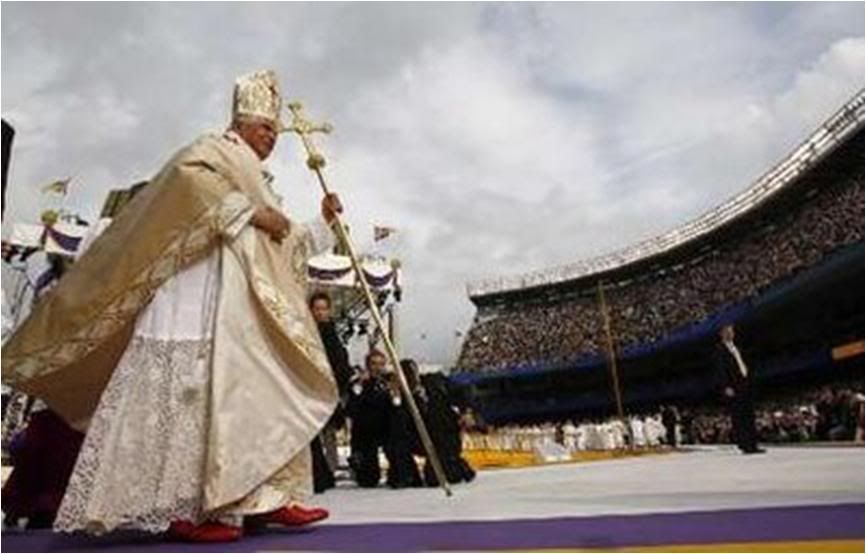
Boat entry to Sydney, 7/15/08:
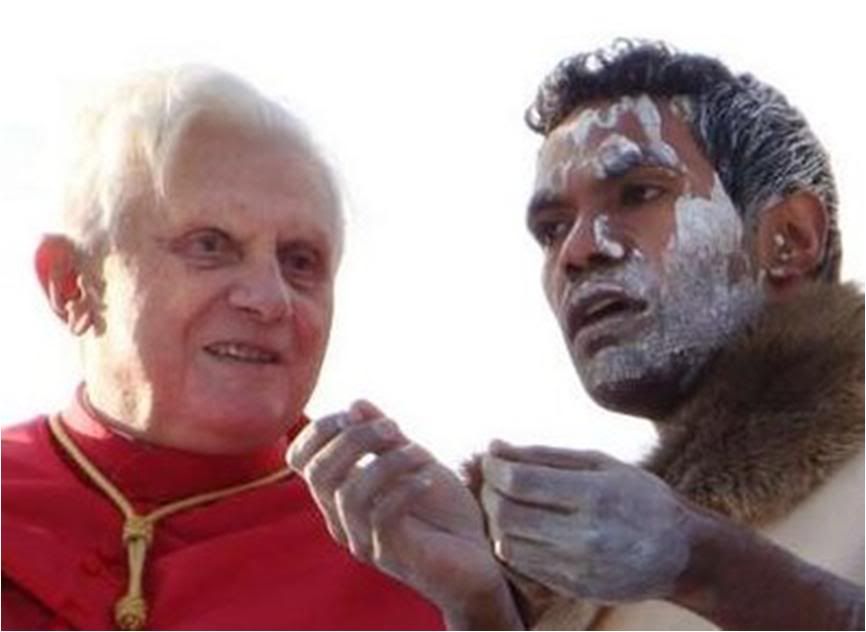
With Stephen Hawking, 9/30/08:
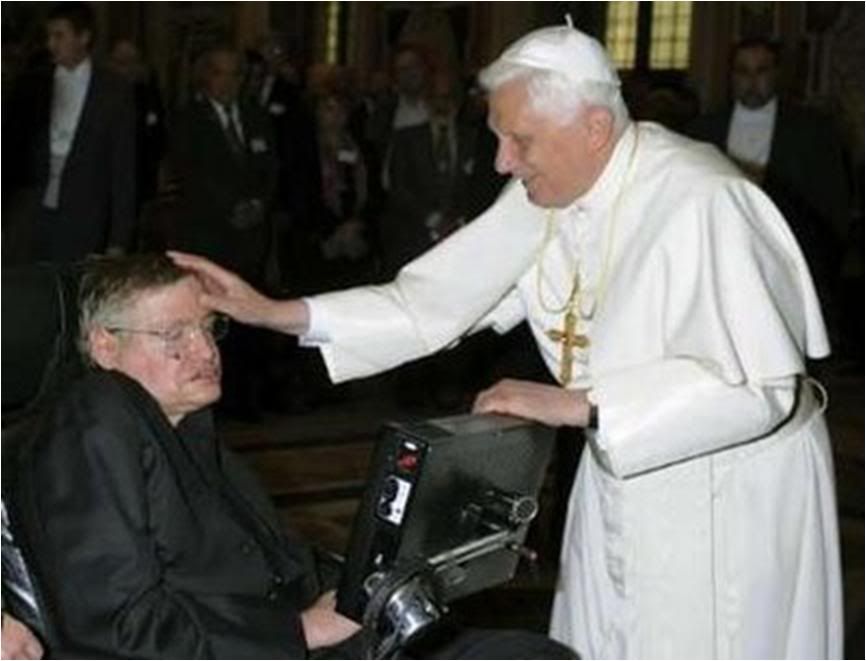
General Audience, 6/18/08:
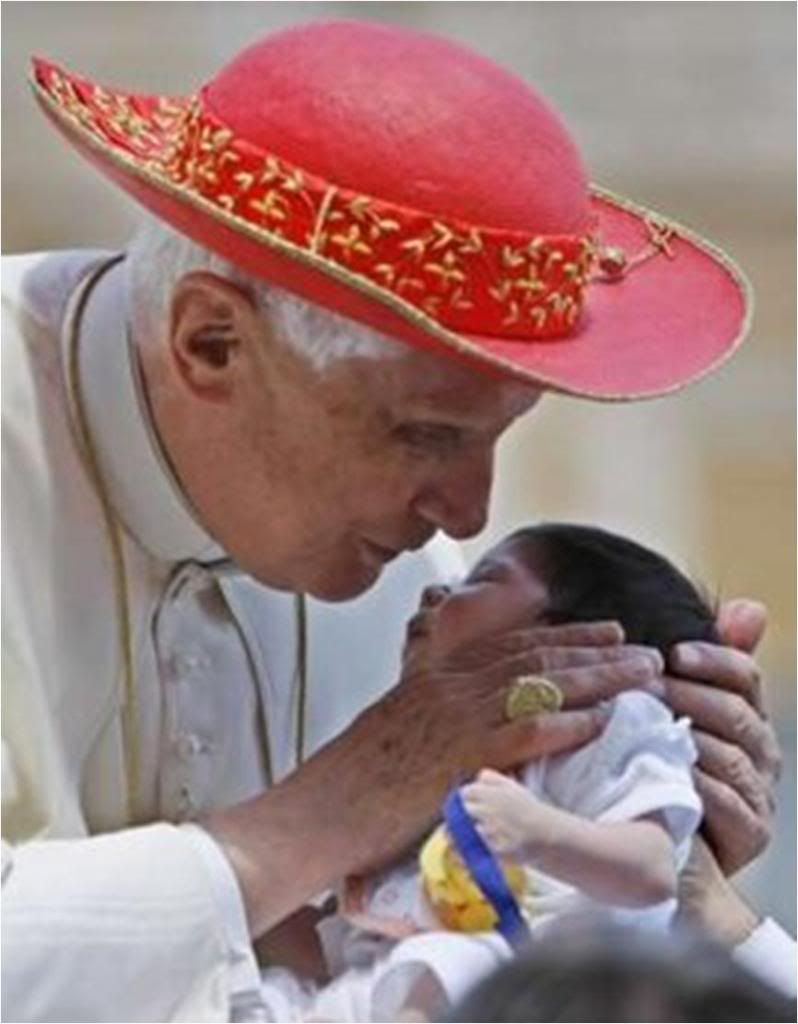
General Audience, 11/05/08:
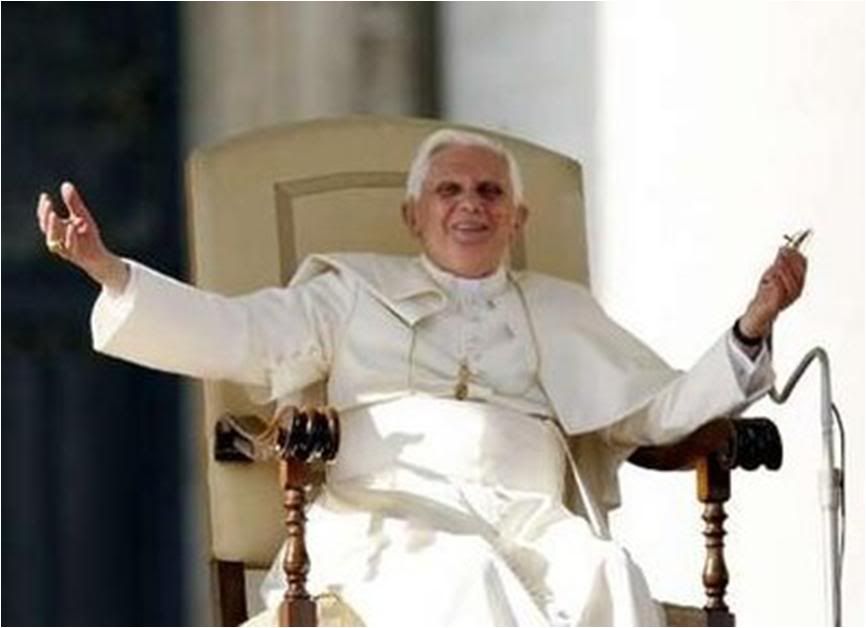
General Audience, 11/18/08:
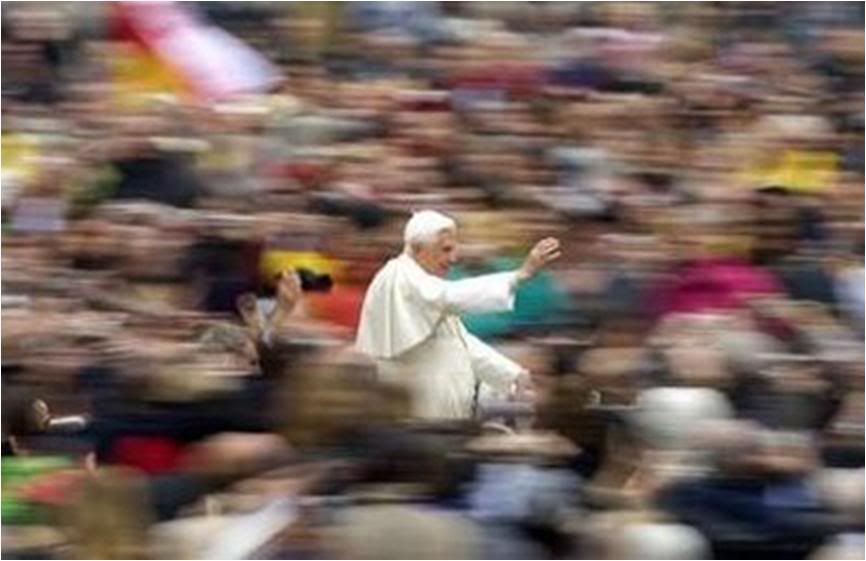 While the occasions may be significant, there is nothing particularly arresting about the selected photos as photographs that distinguishes them in any way from the thousands of photographs taken of the Pope in 2008, let alone of the particular occasions on which they were taken!
While the occasions may be significant, there is nothing particularly arresting about the selected photos as photographs that distinguishes them in any way from the thousands of photographs taken of the Pope in 2008, let alone of the particular occasions on which they were taken!
|
 04/12/2008 13:12 04/12/2008 13:12 |
|
| | | OFFLINE | | Post: 15.877 | Registrato il: 28/08/2005
| Utente Gold | |
|

OR today.
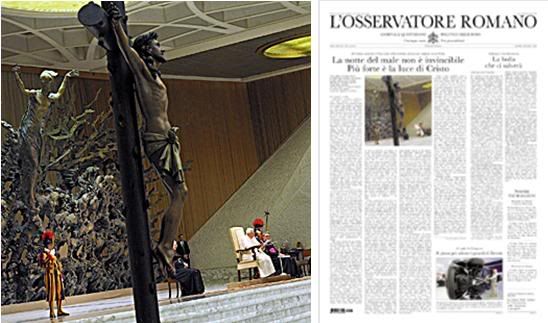
At the General Audience, the Pope speaks of the doctrine of original sin in St. Paul's teaching:
'The night of evil is not invincible; the light of Christ is stronger'
Other stories on Page 1: An editorial commentary on a global rescue credit risk that should involve the poorer countries;
a continuing follow-up on the crusis of the auto industry in the United States; and the Vatican ratifies the new
UN Convention against cluster bombs signed in Oslo yesterday.
THE POPE'S DAY
The Holy Father met today with
- Bishops of Chile (entire delegation) on ad-limina visit. Address in Spanish.
POPE TO BISHOPS OF CHILE:
ILLUMINATE ALL AREAS OF LIFE
WITH THE LIGHT OF FAITH

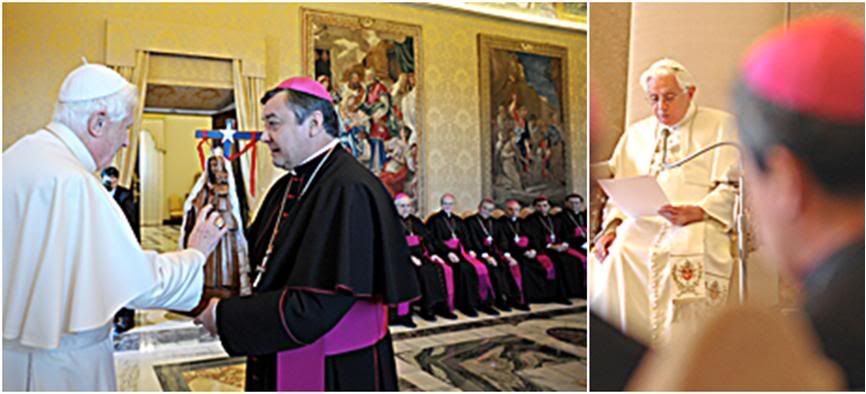
VATICAN CITY, 4 DEC 2008 (VIS) - Benedict XVI today addressed received prelates from the Episcopal Conference of Chile, who have just completed their "ad limina" visit.
The Pope said he was happy at "the chance to share the apostolic labours in the beloved land of Chile".
He invited the bishops "to cultivate an intense interior life and profound faith so that, through the intimate relationship with the Master in prayer, may arise the pastoral initiatives that best respond to the spiritual needs of the faithful".
Referring then to the pastoral guidelines developed by Chilean bishops since the Fifth General Conference of the Episcopate of Latin America and the Caribbean, the Holy Father pointed out that "this great evangelising mission ... requires particular efforts of purification and charity from everyone."
"You are well aware," he continued, "that mankind today feels the urgent need for examples of truly evangelical and coherent life. For this reason the saintliness of all members of the Church, and especially of her pastors, is one of the most precious gifts you can offer your brothers and sisters".
On the subject of priests and seminarians, the Holy Father told the bishops "to remain close to them in their difficulties and help them so that, among the many activities that fill their day, they can give primacy to prayer and the celebration of the Eucharist, which conforms them to Christ the Supreme and Eternal Priest".
"I am also aware", he went on, "of the great efforts you have made to ensure that lay people shoulder the requirements of their Baptism with responsibility and maturity, participating, in keeping with their lay vocation, in the mission of the whole Church. ... They have received the specific vocation of sanctifying the world, transforming it from within in accordance with God's plan".
"All sectors of life can be illuminated with the light of the faith. I am thinking, among other areas, of the world of culture, science and politics; of the promotion of the family founded on marriage between a man and a woman; of the creation of more just working conditions and the assistance of the disadvantaged; of concern for the environment; of defence of human life at every stage of existence, and of the right and obligation of parents to the spiritual and moral education of their children".
Benedict XVI encouraged the prelates to undertake "charitable activity in favour of the poor", and he highlighted how, "following the example of the first community of disciples, we must attempt to make the Church, like the family of God, a place of mutual assistance".
Finally the Pope told them "to continue to cultivate the spirit of communion with the Roman Pontiff and with brother bishops, especially with the episcopal conference and ecclesiastical provinces. ... For everyone, be true models and instruments of communion".
[Modificato da TERESA BENEDETTA 05/12/2008 15:41] |
 04/12/2008 15:44 04/12/2008 15:44 |
|
| | | OFFLINE | | Post: 15.878 | Registrato il: 28/08/2005
| Utente Gold | |
|
 The Pope's Christmas gift:
The Pope's Christmas gift:
A tough line on Church doctrine
By Jeff Israely

Wednesday, Dec. 03, 2008
As I have been virtually absent from the Forum for much of the past two days, I did not get to see this until today. I thought I had become fairly immune to 'Jeffisraely-rabia' but I continue to be highly susceptible to outrage when I encounter unbridled, unbalanced prejudice by anyone on any subject I care about.
'A tough line on Church doctrine'! What else should the spiritual leader of the Catholic Church have but a tough line on doctrine, if by 'tough' is meant standing firmly for what the Church has taught for 2000 years? The Pope would be in flagrant dereliction of duty if he did otherwise. This is simply creating an issue where there is none.
Those nicknames from the past — God's Rottweiler, the Panzercardinal — don't seem to stick anymore. After acquiring a reputation as an aggressive, doctrine-enforcing Cardinal, Pope Benedict XVI has surprised many with his gentle manner and his writings on Christian love. [But preaching and practising love does not rule out discipline! Have not contemporary psychoanalysts even invented a term for it - 'tough love'?]
But with the Christmas season upon us, there is growing proof that the 82-year-old Pope is also quite willing to play the part of Scrooge to defend his often rigid view of Church doctrine.
[Can doctrine be anything but rigid? Flexible doctrine is no doctrine at all! Again and again, I must protest: How can anyone with common sense fail to see that any religion is also a discipline? And yet, anti-religion ideologues and laissez-faire Christians appear so willing and ready to abdicate common sense in this respect. New Age faddists who 'religiously' follow disciplines in yoga, vegetarianism or what-have-you are left alone or even praised for their 'disciplined' lifestyles, while Catholics - especially the Pope - are scorned for keeping religious discipline!]
Benedict's envoy to the United Nations, Archbishop Celestino Migliore, has announced that the Vatican will oppose a proposed U.N. declaration calling for an end to discrimination against homosexuals. [First of all, the Vatican has always made known it would oppose the proposal. So it was not news. It only became news because two sentences Migliore made to a French news agency were instantly seized upon and twisted to 'make news'.]
At first blush, no one should be surprised to find the Catholic Church hierarchy butting heads with gay rights activists. But this particular French-sponsored proposal, which has the backing of all 27 European Union countries, calls for an end to the practice of criminalizing and punishing people for their sexual orientation. Most dramatically, in some countries, including Iran and Saudi Arabia, homosexuality can be punished by death.
Papal spokesman Father Federico Lombardi was forced to clarify that the Vatican continues to condemn the use of the death penalty for any crime, including those associated with homosexuality. ['Forced to clarify' because Migliore's statements were precisely to explain why the Vatican was opposing the proposal, and yet those statements were ignored by the media in favor of making it appear that the Vatican was actually in favor of criminalizing homosexuality! The headlines in the Italian newspapers were particularly - and unnecessarily - incendiary]
Instead, Migliore said the Vatican's opposition to the U.N. proposal was driven by concern that countries that prohibit gay marriage would somehow be targeted.
Said Migliore: "Countries that don't recognize the union between people of the same sex as marriage will be punished and pressured."
The U.N. declaration does not in fact mention gay marriage, and most of the nations that support it themselves don't allow people of the same sex to wed. [But Migliore never said it did. Rather, that it's a document that could be used eventually to pressure UN member states who do not juridically recognize gay marriages to do so. Israely should know more than most how clever liberals are at devising all sort of Trojan horses to put their pet causes in place and on firm legal footing in society - the US FOCA proposal being the most blatant of such devices.]
Archbishop Migliore confirmed on Tuesday that the Vatican had also refused to sign a U.N. document last May in support of the rights of the disabled because it did not include condemnation of abortion, NOR the rights of a fetus with birth defects. [Not just that it does not include condemnation of abortion but affirms the right to 'reproductive health' which is UN-speak for abortion on demand.]
Vatican officials nevertheless voiced support for the central principles of the disabled rights document, which Migliore helped craft before the final decision to withhold the Holy See’s signature.
The Italian gay rights association Arcigay says the Vatican's opposition to the anti-discriminatory measure is "unprecedented," and the citing of gay marriage is an "excuse" to distract people from the real intent of criminalizing gays.
One Rome-based priest was disappointed that the Vatican decided to publicize its opposition to what appears a rather innocuous declaration. [Ho-hum! The usual anonymous but 'damning' testimonial! Either the priest is an Israely fiction to give voice to his own personal opinion, or he exists but is too cowardly to identify himself. And the media freak show was not the Vatican's idea. Its position has never been a secret. But, anything to find fault, right?]
"When you're always trying to look for new ways to make your point, you lose credibility," says the priest. "Better sometimes to keep quiet."
Benedict has said repeatedly that the Church is forced to speak out against the tide of secularization, especially in Catholicism's home turf in Europe. His kindly manner notwithstanding, Benedict does not seem to hesitate doing or saying what he deems necessary to keep Catholicism from straying too far from its doctrinal tradition.
And that includes revisiting the Catholic liturgy if necessary. His top Vatican deputies are now studying a change to the mass that would affect the moment when members of the congregation are asked to greet each other with a "sign of peace." Worshippers then exchange handshakes, or sometimes a hug or kiss.
In 2007, writing about the exchanging of the peace, Benedict called for "greater restraint in this gesture which can become exaggerated and cause a certain distraction in the assembly before the reception of Communion." It may now be moved earlier in the service.
Cardinal Francis Arinze, head of the Vatican's liturgical office, said last month that the affectionate gesture is often misunderstood. "It is thought to be a chance to shake hands with friends. Instead it is a way to tell those nearby that the peace of Christ, really present on the altar, is also with all."
Though there is no indication if or when the proposed movement of the peace would happen, this change would respond to a desire by the Pope to rein in some of the excesses that he sees in the ways the faith is currently celebrated.
[But why so much fuss about letting people do as they please about the Sign of Peace? The world is not going to have a pandemic of constipation on Sundays if exuberant types restrain themselves to an appropriate expression of the 'peace' sign. Mass is a celebration of God and a commemoration of the Lord's supreme sacrifice. It's no place for a group hug, just as it is not a social occasion, although it is community praying together.]
And to those who wonder why not just let everyone to say 'peace' when and where they please for Christmases to come, one can imagine Benedict flashing that gentle smile, tilting his head ever so slightly and declaring: Bah Humbug!
[Israely's flippancy about the Sign of Peace is out of place. Liturgy is not mindless rite that one follows by rote. It is a solemn ritual, and therefore, it has its rules that must be followed, otherwise it is no longer ritual. One has all the time outside Mass to do as one pleases if one so chooses. For one hour a week, cannot a Christian forget self-indulgence for once and direct all his thoughts to God? Everything else that is good follows from this.]
Here is the right place to post a much-needed clarificatory article by Luigi Accattoli in yesterday's Corriere della Sera about this whole business of the Vatican's participation in UN conventions:
 The Vatican has no 'nation'
The Vatican has no 'nation'
on which to enforce a UN convention -
and it must stand up for Church doctrine
by Luigi Accattoli
Translated from

December 3, 2008
VATICAN CITY - It has happened many times before and it will happen again that the Holy See does not always sign documents and resolutions by the United Nations and its various agencies.
This has just happened - not yesterday, but over a period of two years - for the Convention on rights for disabled persons.
Of course, the Vatican finds the Convention useful and necessary - "an important step on the road to equal opportunities for everyone", Vatican Radio said - but it cannot sign on to it because it has statements on 'reproductive health' (read 'abortion') that go against Church doctrine.
One must keep in mind the unique character of the Holy See as a sovereign state - it has no 'nation' to legislate over, in accordance with a given UN convention, but its function is to be the doctrinal guide for the entire Catholic community worldwide.
No one is hurt or prejudiced by its failure to sign on to a document which it even recognizes openly as necessary and timely. But it cannot compromise its magisterium by signing on to a text that it does not fully subscribe to.
It was thus in 1994 for the final document of the Cairo conference on population, when so-called 'anti-natalist policies' were objectionable to the Vatican.
Then again, the following year, at the Beijing conference on women, when it could not sign a final document that advocated abortion on demand.
In both cases, Vatican spokesmen present at the conferences encouraged other nations to adopt the 'socially constructive' elements of the declarations.
In the case of the convention on rights for the disabled, a special service of Vatican Radio has been clarifying this double register of formal opposition and practical adherence to its acceptable provisions - those that promote "equal recognition before the law, freedom of expression and opinion, exercise of voting and other forms of participation in political and public life, access to support programs by the State in economic, psychological and health matters".
The service concludes by saying that the ratification and implementation of these provisions are necessary to the achievement of the UN's Millennium Development Goals.
Here's a UN Convention the Vatican did sign today, but MSM will probably ignore it altogether - as they did the significant statement to the Doha Conference made two days ago [posted in CULTURE & POLITICS...] when the 'homosexual' story took up all the oxygen.
HOLY SEE SIGNS CONVENTION
BANNING CLUSTER BOMBS

VATICAN CITY, 4 DEC 2008 (VIS) - Archbishop Dominique Mamberti, secretary for Relations with States yesterday participated in a ceremony, held in Oslo, Norway, to sign a Convention prohibiting the use, production, transfer and stockpiling of cluster munitions, the text of which was approved on 30 May in Dublin, Ireland.
In his address, Archbishop Mamberti stated that "in order to send out a powerful political signal, the Holy See is ratifying this Convention on the same day as the signing. In the first place we wish to express to victims the human proximity of the Holy See and its institutions. We also wish to launch an appeal to States - especially to the producers, exporters and potential consumers of cluster munitions - to join the current signatories, so as to assure victims, and all countries gravely affected by these arms, that their message has been understood.
"Credible security is not only possible, but actually more effective, when it is based on co-operation, on trust and on a just international order", while "order founded on the balance of power is fragile, unstable and a source of conflict", the archbishop added.
The head of the Holy See delegation to the Oslo ceremony then indicated that "through contributions on everyone's part, the house of peace is now stronger, yet perseverance and patience are indispensable for its consolidation".
An English-language declaration accompanying Archbishop Mamberti's speech states that "in ratifying the Convention ... the Holy See desires to encourage the entire international community to be resolute in promoting effective disarmament and arms control negotiations and in strengthening international humanitarian law by reaffirming the pre-eminent and inherent value of human dignity, the centrality of the human person, and the 'elementary considerations of humanity', all of which are elements that constitute the basis of international humanitarian law.
"The Holy See considers the Convention on cluster munitions an important step in the protection of civilians during and after conflicts, from the indiscriminate effects of this inhumane type of weapon", the text adds.
"The Holy See", the document concludes, "considers the implementation of the Convention as a legal and humanitarian challenge for the near future. An effective implementation should be based on constructive co-operation of all governmental and non governmental actors and should reinforce the link between disarmament and development. This can be done by directing human and material resources towards development, justice and peace, which are the most effective means to promote international security and a peaceful international order".
[Modificato da TERESA BENEDETTA 04/12/2008 22:05] |
 05/12/2008 00:18 05/12/2008 00:18 |
|
| | | OFFLINE | | Post: 15.883 | Registrato il: 28/08/2005
| Utente Gold | |
|
 Dialog according to Benedict XVI:
Dialog according to Benedict XVI:
The concrete terrain
of cultural encounter
by Lucetta Scaraffia
Translated from
the 12/5/08 issue of

In the letter to Marcello Pera published in the book Perché dobbiamo dirci cristiani (Why we should call ourselves Christians), Benedict XVI wrote that an "intercultural dialog is necessary) to examine in depth the cultural consequences of fundamental religious choices".
Although the statement provoked many reactions, it was certainly not the first time that the Pope has expressed this position and has sought to direct inter-religious dialog in this direction.
After the first Mass he celebrated as Pope on April 20, 2005, he said, "I will not spare effort and dedication to follow the promising dialog started by my venerated predecessors with different civilizations, because it is reciprocal understanding that will bring about the conditions for a better future for all".
This statement, followed and confirmed by other similar statements, made it clear that the attitude of the Holy See on dialog with other religions - among which, obviously, Islam stands out - would take a new tone. That it would pass from a theoretical exchange to a concrete encounter between the cultures that have been the fruit of various religious traditions.
The 2000 declaration Dominus Iesus had, in fact, clarified irrevocably that inter-religious dialog should stay away from any path that would lead to a 'relativism of religions', a danger that had become real in a climate that had turned - in the words of Cardinal Joseph Ratzinger from an interview published in La Repubblica on January 16, 2005 - into "some kind of moral and intellectual anarchy... (which) leads to no longer accepting a unique truth. Inter-religious dialog should never become a movement towards a void".
In fact, if the dialog should turn to theological subjects like the nature of God and the way to salvation, then it would be impossible not to get into the sterile plane of obvious divergence, or on the other extreme, to consider all religions as equally true.
Dominus Iesus was intended to take a clear stand not only on the various lines that were being manifested in inter-religious dialog on a theoretical level (i.e., in view of new 'openings' advanced by some Catholic theologians) - although this was the only aspect that merited the attention of commentators - but also with regard to a concrete process of inter-religious practices that were under way in various international organizations.
At the United Nations, in fact, well-financed international groups were forming in the guise of diverse inter-religious movements that propose to do away with traditional religions in favor of a a world religion, which would be common to everyone, and that would supposedly guarantee peace in the world.
In a climate that was increasingly less interested in religious freedom - and seeking, because of this, to place all religions on the same footing, whether they were tolerant or intolerant, willfully equating proselytism with violence - UN documents were already stating that whoever considered his own religion true as opposed to any other was guilty of fanaticism and therefore of 'religious hatred', even if the attitude of simply practising one's own religion did not imply recourse to discrimination or violence.
Indeed, today, there is already a global network in place, formed by some 15 international organizations that call themselves inter-religious, and which have managed to organize big meetings.
It was in the face of these facts - of which many Catholics involved in inter-religious dialog appear not to be aware of - that the Church considered it necessary to define and declare certain points unequivocally - namely, the uniqueness and universality of the salvation offered by Christ to mankind, with his Church as the absolute mediatrix of this salvation.
In effect, Dominus Iesus defined the theological terms within which dialog with other religions can take place - terms which are obviously not flexible or negotiable.
But Benedict XVI has made clear that dialog should be between the cultures that have been the product of the world religions. Having a cultural focus allows the dialog to take up central cultural issues like the dignity of the human being, respect and equal rights for women, religious freedom - issues which are not touched in theological dialog or prayer meetings.
Benedict XVI's first meeting with representatives of other religions took place in Cologne, in the fifth month of his Pontificate, during the 20th World Youth Day.
Particularly significant was his meeting with Muslim leaders on August 20, 2005, which was billed strictly as a cultural encounter. At the time, the Jesuit priest Samir Khalil Samir commented that the Pope's words indicated a new pragmatic line: "Dialog with Islam and other religions cannot be essentially theological or religious except in the broad sense of moral values. It should be a dialog of cultures and civilizations".
And this is because, the Lebanese scholar on Islam pointed out, "it has to do with living together under concrete aspects involving politics, the economy, history, culture, customs and practices".
Thus. Benedict XVI proposed that if religions were to find a common basis, they should "set the anthropological foundations for a cultural dialog, because only these are universal and common to all human beings".
Shifting the focus to cultural dialog from the religious has allowed Benedict XVI to focus on central issues like human dignity and religious freedom, but also to keep a distance from certain aspects of Western modernity which are contrary to Catholic tradition and teaching.
This has to do above all with what distinguishes Western culture and other traditions - the role of women, and consequently, sexual and family ethics.
The Pope, while a strong advocate of equality for women, does not share the Western women's liberation emphasis on separating sexuality and reproduction, distancing itself from, and even rejecting, women's biological role as mother.
It is part of what he sees as the moral crisis of the West, as he noted in the interview book Salt of the Earth, identifying such a moral crisis as the principal reason for the conflict with the Muslim world.
"The great moral crisis of the West is that of the Christian world," Cardinal Ratzinger said. "In the face of the profound contradictions in the West and its internal confusion - even as the Arab world has gained economic power - the Islamic spirit has reawakened, and they feel, 'We have the better, stronger identity; our religion has endured, whereas you have lost yours'. So they feel that they have remained on the scene as the world's most vital religion, that they can give the world something, and because of this, they are the true religious force of the future... (because) Europe has come to hate itself."
And there is no doubt that the cardinal identified one of the central reasons for the decadence of the West in that the separation between sexuality and procreation has become a Western 'right' and article of secular faith.
Since the Pope and the Church clearly do not share this mindset, he has an opening for a positive relationship with other cultures who look with concern and a certain contempt at what is going in the West.
It includes the attempt to rid marriage of everything that could mean sacrifice and renunciation, in favor of individual realization by each partner, thus destroying - or at least, emptying the institution of its social significance.
In this context, the Pope, in his first encyclical Deus caritas est, reminded both the secularized Western culture and other cultures about the richness of Christian marriage. And so, once again, a theological subject like love and matrimony can be oriented towards cultural dialog, to an encounter that is non-ideological but linked to the daily life of human beings, to that daily life in which coexistence among different cultures is experienced and realized.
Thus, the displacement of dialog from theoretical and theological grounds, which are abstract, to the more concrete forms of cultural expression, allows for a genuine attempt to work out ways of coexistence instead of creating nothing but the appearance of dialog.
It also highlights the differences between the cultural tradition born from Catholicism and the markedly secularized drift of contemporary Western culture.
Marcello Pera's now-celebrated book actually was not presented in Rome till this afternoon (12/4) by former Foreign Minister Massimo D'Alema and Cardinal Camillo Ruini. L'Osservatore Romano published a substantial portion of the cardinal's presentation.
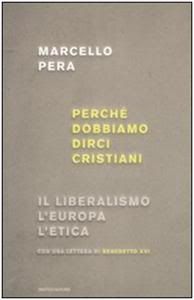 Perché dobbiamo dirci cristiani
Perché dobbiamo dirci cristiani
Marcelo Pera
Milan, Mondadori, 2008, 196 pp.
Liberalism negates itself
when it is outside Christianity
by Cardinal Camillo Ruini
Translated from
the 12/5/08 issue of

Marcello Pera's book is definitely important in itself, but it has become even more important for the unusual letter that Benedict XVI has written to the author.
One could call it a book with a thesis in the positive sense, in that it sustains a position that is stated clearly from the start and then reasoned out through all the pages.
Already, in his introduction, Pera writes: "My position is that of a layman and a liberal who looks to Christianity to ask of it the reasons for its hope".
The conclusion of it all - and of each of the three parts in which the book is divided - is that 'we should call ourselves Christians" - a powerful conclusion that is very much against the mainstream, something the author is well aware of.
Therefore the book is well within the debate on Christianity which has pervaded the West for so many years, with new vigor. It is a debate that moves between two [p;es: those who would like to expunge Christianity from our public culture, or at least, re-dimension its presence, and those who are trying to maintain and re-motivate this presence, maintaining that it is particularly necessary and beneficial today.
In this context, Benedict XVI's letter is extremely important. An unaccustomed letter, I said earlier, but not at all isolated. It is part of a sustained relationship and series of convergences between Marcello Pera and Cardinal Ratzinger, later Benedict XVI.
The book is dense with references and rich in profound analyses, but its structure is substantially simple and serves each of the three chapters, dedicated, respectively, to liberalism, Europe and ethics.
Since it is not possible here to follow the thread of the various developments, I will limit myself to some nodal points which I think most relevant.
The first, which the author expressly addresses only in the third chapter, but which plays an essential role throughout the book, is the relationship between liberalism and relativism.
Elsewhere in the book it is made clear that authentic and original liberalism - that of the 'fathers', embodied principally by John Locke, Thomas Jefferson, and Immanuel Kant - was the doctrine of the fundamental rights of man as man - the rights now recognized in international charters - which precedes every positive decision made by States and are based on an ethical conception of man that is considered true and trans-cultural.
Still with reference to the 'fathers' of liberalism, the author underscores the theistic and Christian matrix of these rights, inscribed into our nature by the Creator: for this, as the American Declaration of Independence says, "all men are created equal... endowed by the Creator with certain inalienable rights". Thus, while on the one hand, the incompatibility of liberalism with relativism is confirmed, on the other hand, its 'not extrinsic nexus', historical and conceptual, with Christianity emerges.
One value of the book is to have subjected to an examination in depth the positions and motivations of some of the principal theoreticians of liberalism who do not share its thesis, among them, most especially, John Rawls and Juergen Habermas (though the latter is not a liberal in the strict sense).
They stand by the self-sufficiency of political liberalism, in the sense that it is not based on on any 'pre-political' reading - whether it is ethical, metaphysical or religious - and and also that it distinguishes and separates the public non-religious sphere from the private sphere, religious or other type: even if later, this aspect of separation, in the same authors - especially Habermas - is in good measure attenuated and corrected, making their position somewhat uncertain and not very consistent even.
Marcello Pera shows how this self-sufficiency of liberalism is only apparent, since in reality, it presupposes recognition of the other as a person and as an end in himself.
Quite different was the position of Benedetto Croce - especially in his celebrated essay Perché non possiamo non dirci cristiani (Why we cannot not call ourselves Christian) - who makes a great and moving eulogy of Christianity as the greatest as well as the most decisive revolution that mankind has achieved.
His liberalism is not a juridico-political doctrine, but "a total conception of the world and reality": concretely, freedom is the Spirit in history, whereas "the development of the Spirit" is the path itself of freedom.
In this immanentist conception, the Christian revolution can only be one moment in the development of the Spirit, destined to the be reabsorbed into the immanence of the Spirit itself. Therefore, while the idealist philosopher sees in the religious man his 'younger brother, himself at an earlier moment", the latter cannot not see in the philosopher "his adversary, much less his mortal enemy".
Pera concludes that in this way, Benedetto Croce - despite himself -ends up giving a philosophical justification, which is not just contingent as for example, anti-clericalism is, on the 'secular equation' that would identify authentic liberalism with overcoming religion and with secularism.
At this point, it is possible to take note more rapidly of other defining theses of this book. In particular, that regarding multi-culturalism, which the author examines, correctly, right after speaking of relativism, with which multiculturalism has a profound connection.
It does not only have to do with the fact that modern societies are complex and contain minorities - communities, groups, of various races and cultures. Specific and decisive in the multicultural approach is the conviction that there cannot exist any criteria to evaluate if one culture is better or worse than another: that every form of culture, in fact, would have its own irreducible characteristics which deserve the very same respect as the others.
Marcello Pera of course recognizes the contribution of cultures to the formation of personal identity and to the very life of a free society, on condition that the fundamental and natural rights of the human being are respected and prevail over any cultural difference.
It is here where multiculturalism shows its limitations, because its internal logic leads it to misrecognize the universal and inalienable character of such rights.
Its practical consequences are in turn often regrettable: they make the most open society insecure of itself and can lead it to repudiate its own identity, whether cultural or religious, while on the other hand, it does not facilitate but impedes the effective integration of immigrants.
Even in this respect, Benedict XVI's letter contains unequivocal words: "Not less impressive is your analysis... of multiculturality
in which you show the internal contradiction of this concept and therefore, its political and cultural impossibility".
Connected to the great questions on liberalism, relativism and multiculturalism is the question of Europe and its identity and unity, in relation to the role that Christianity had and has on the continent.
The entire second part of the book is dedicated to this, but let us limit ourselves to the central point: Marcelo Pera identifies the key reason for the persistent difficulty in the process of European unification, particularly, of the failures so far in connection with the European Constitution, in the refusal to recognize adequately the role played by Christianity in the formation of Europe and its identity, and even in the construction of the liberal State.
In fact, it is true that the traditions of Europe are composite, and that in the course of centuries, an ample mix of cultures has occurred, but the soul of Europe is Christianity, which articulated, fused and brought to unity these diverse cultures and traditions into a framework that made Europe 'the Christian continent'.
Christianity, as Habermas acknowledged, is the spring which nourishes what Habermas himself defines as 'the normative self-understanding of modernity', without which present-day optional alternatives would not be available.
Not to acknowledge this decisive datum, and to want to base European unity only on an abstract 'constitutional patriotism', Habermas seems to propose, leaves Europe without a precise identity and without a truly unifying principle, besides dividing the West by distancing Europe from America.
For these reasons, Pera concludes without hesitating: "Europe should call itself Christian", getting strong agreement from Benedict XVI who writes him: "Of fundamental importance is your analysis of what Europe could be and of a European Constitution in which Europe does not transform itself into a cosmopolitan reality, but finds, starting from its Christian-liberal foundation, its own identity."
With regard to the problem of religious fundamentalism, and in particular, Islamic fundamentalism, the book also deals with the subject of inter-religious dialog, to which the Church has invited all Catholics since the declaration Nostra aetate of the Second Vatican Council.
Marcello Pera states clearly that such a dialog, "in the technical and strict sense", cannot exist, because it presupposes that the interlocutors are ready to change and even to reject the truths with which they start off their dialectical exchange, whereas religions, especially the moontheistic and revealed religions, each have their own truths and their own criteria for accepting truth.
Thus, recalling the invitation to a 'dialog of cultures' with which Benedict XVI concluded his famous Regensburg lecture, he proposes that religions establish among themselves this second form of dialog, not about their dogmatic nucleus, but the cultural consequences - particularly of the ethical kind - of the different religions, namely, the rights that are attributed or denied to man, the social customs that are allowed or prohibited, the forms of interpersonal relationships that are permitted or censured, the political institutions that are recommended or banned.
This intercultural dialog among religions can be a dialog in the strict sense and could lead the interlocutors to review their own initial positions, correct, integrate, or even reject them, without this necessarily implying that their own dogmatic nucleus is placed in question.
The moral patrimony of humanity, inalienable and non-negotiable, represents, in Pera's view, the great common ground for such a dialog.
One last point that I wish to note is that of "the trajectory of liberal ethics', which the book treats towards the end. With Kant as his first point of reference, then John Stuart Mill, and finally the interpretations of liberalism that are prevalent today, Marcello Pera traces this trajectory:
With Kant, moral law is the law (Christian) of the categorical imperative, by which universal reason commands the will, in a way that is equally universal. This law imposes respect on the person.
With Stuart Mill, moral law is the law (utilitarian) which sees as good any action or rule which results in the greatest usefulness for everyone. This law imposes respect for freedom.
For the prevalent liberal currents today, there is no universal moral law, religious or secular, and - in this liberal world, particularly in the West - what matters is respect for the free choice of values by individuals.
We have thus passed from universality to relativity, and from the integral human being to a subject who is the only norm for himself. The author draws the consequence that here, too, we find ourselves before a crossroads for liberalism - between Christianity and secularism - as he indicated at the start of the book.
And at this point, the crossroads may be described this way: either liberalism joins itself to a concrete doctrine of good, in particular, Christian doctrine of which it is a congener (the same roots), in which case, it has something to offer to the contemporary moral crisis; or liberalism professes its self-sufficiency, 'neutral' or 'secular', and thus becomes itself a multiplier of the crisis.
Even here, Beneedict XVI shows his interest and agreement, writing: "You show that liberalism, without ceasing to be liberalism but, on the contrary, in order to be faithful to itself, can link itself to a doctrine of good, in particular, the Christian doctrine which is its congener, thus truly offering a contribution to overcoming the crisis".
* * * * * * * * * * * * * * * * * * * * * * * * * * * * * * * * * * * * * * * * * * * * * * * * * * * * * * * * *
Interestingly - and questionably - the extract of Cardinal Ruini's intervention published in OR omits an important paragraph that Sandro Magister noted in his blog yesterday:
High politics:
Ratzinger's thinking
condensed in 5 precepts

Dec. 4, 2008
The precepts have to do with Europe, liberalism, multi-culturalism, inter-religious dialog adn public ethics.
Each is condensed in a few clear and unequivocal lines in the letter that Benedict XVI wrote Marcello Pera, which appears as a preface to the latest book written by the philosopher senator.
Of the five precepts, the first one - on the Christian liberal foundation of Europe - is not new in the thought of Joseph Ratzinger. But the others cannot be taken for granted, as Cardinal Camillo Ruini remarked in presenting the book today along with the author and Massimo D'Alema as a counterpoint.
"The other positions [taken by the Pope] - " Ruini said, "on the rootedness of liberalism in the Christian image of God, on multiculturality, in onter-cultural rather than inter-religious dialog, and finally on the relationship between liberalism and the Christian doctrine of good - are surely well within the lines of thinking that Joseph Ratzinger-Benedict XVI has expressed and examined in depth on many occasions, but nevertheless constitute - by their content, by the vigor and clarity with which they are formulated - significant developments or clarifications that contribute not a little to the current debate on the relationship between Christianity adn the contemporary world."
In fact, Magister has posted the entire text of Cardinal Ruini's presentation, which I will post as soon as I have translated it, having learned to admire Cardinal Ruini's own clear pbilosophical and theological thinking - thanks to full texts of his important discourses that Magister has been posting.
[Modificato da TERESA BENEDETTA 05/12/2008 16:15] |
|
|
|
|